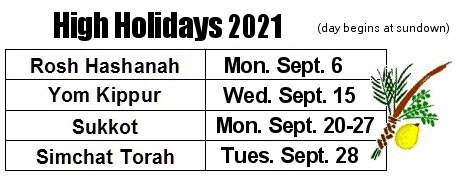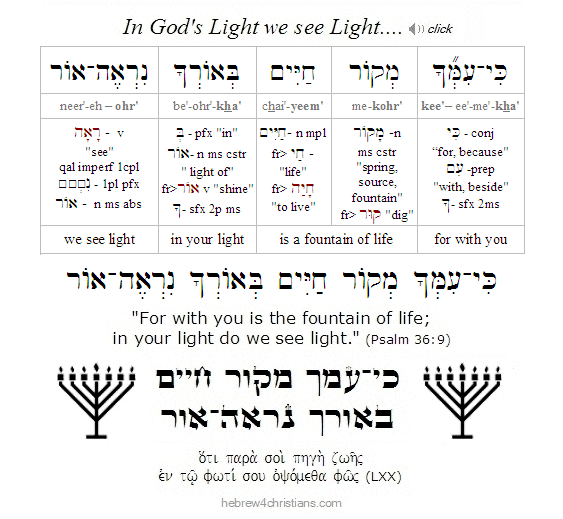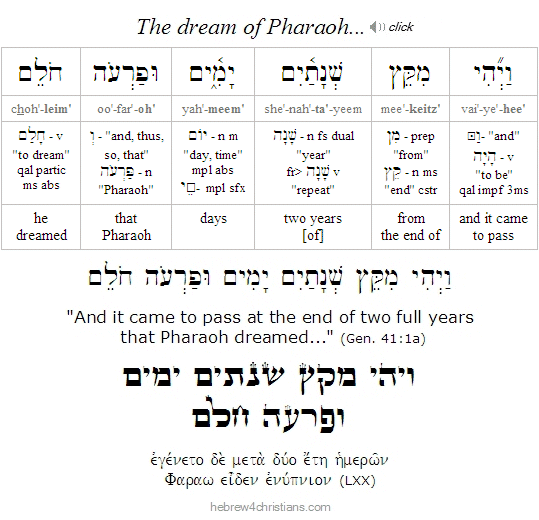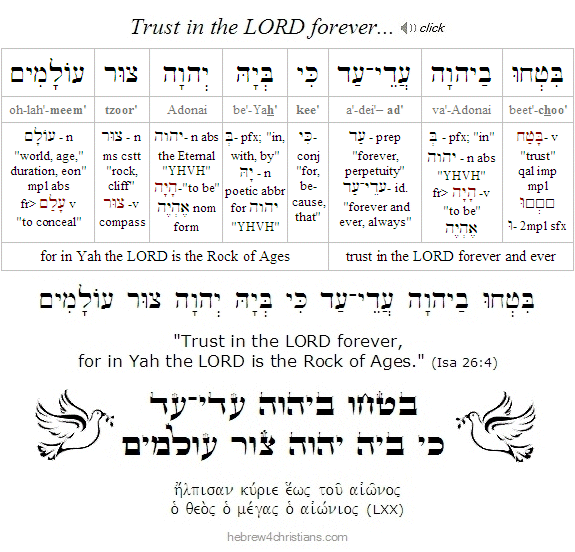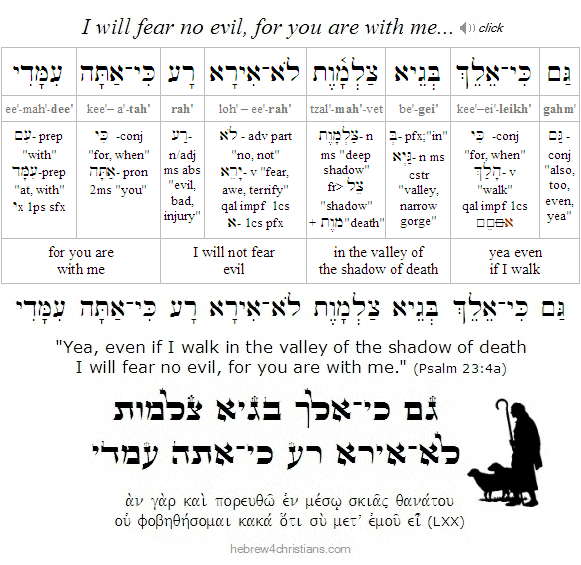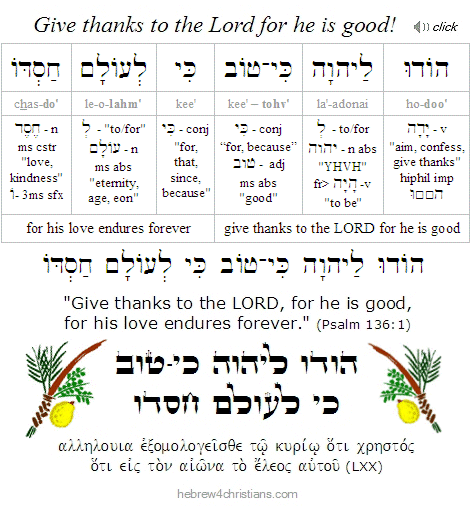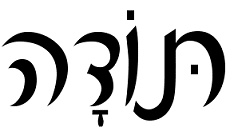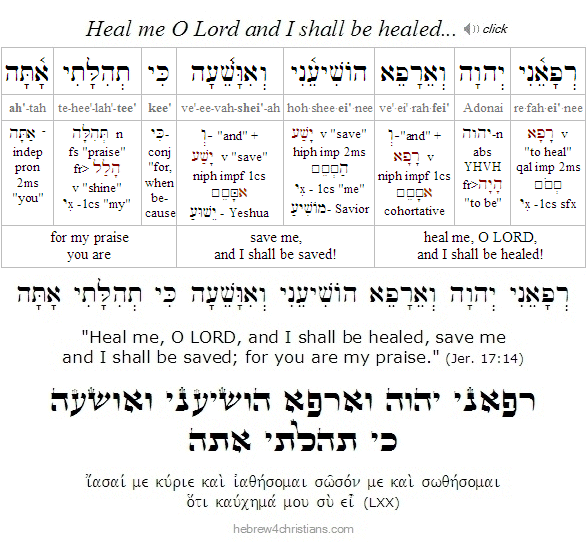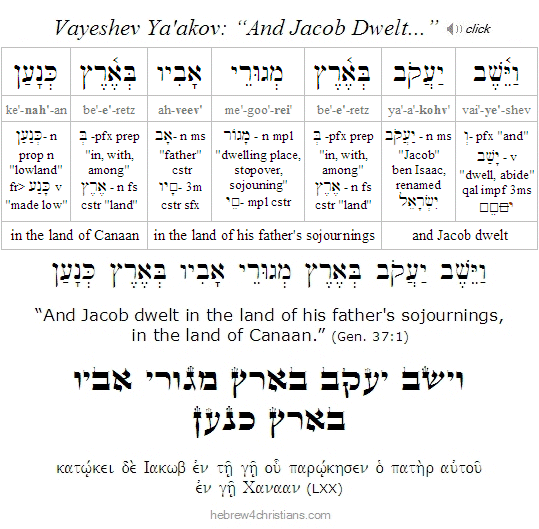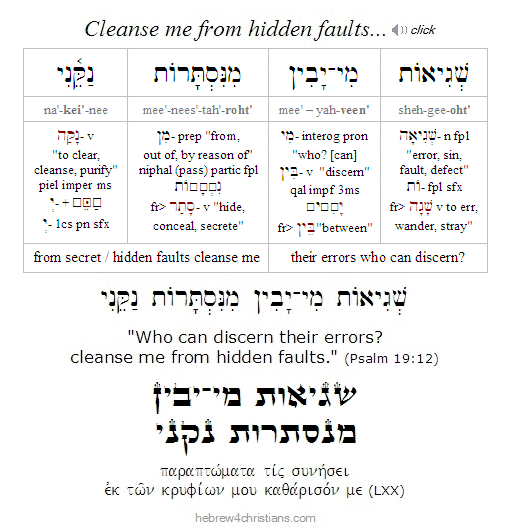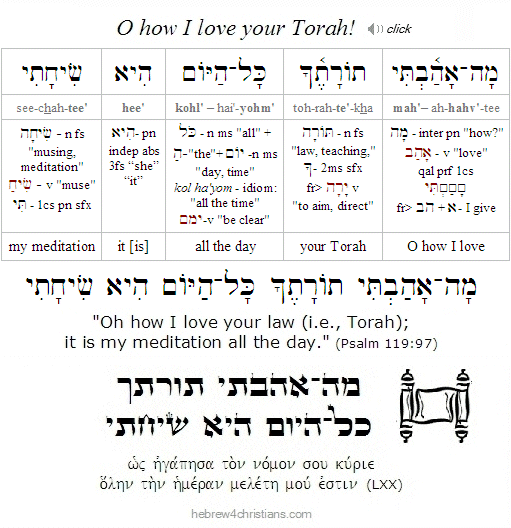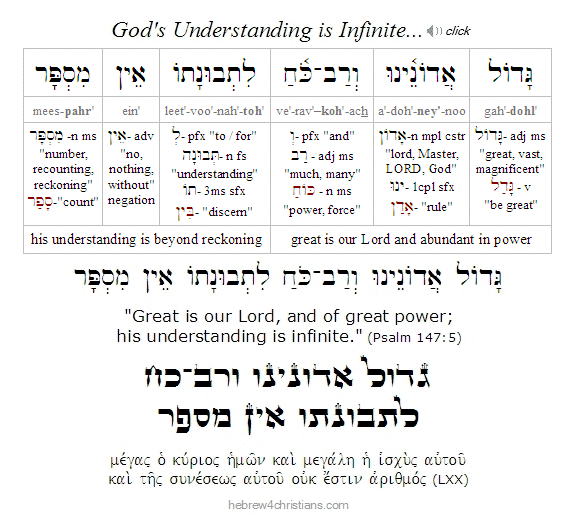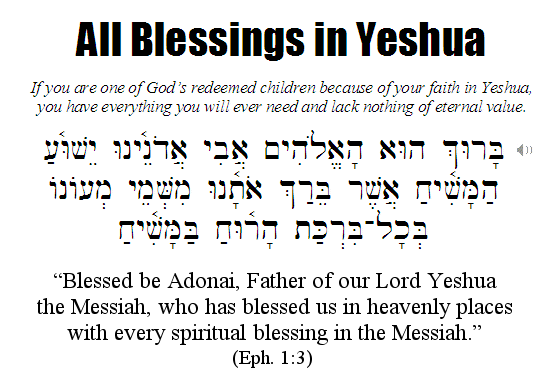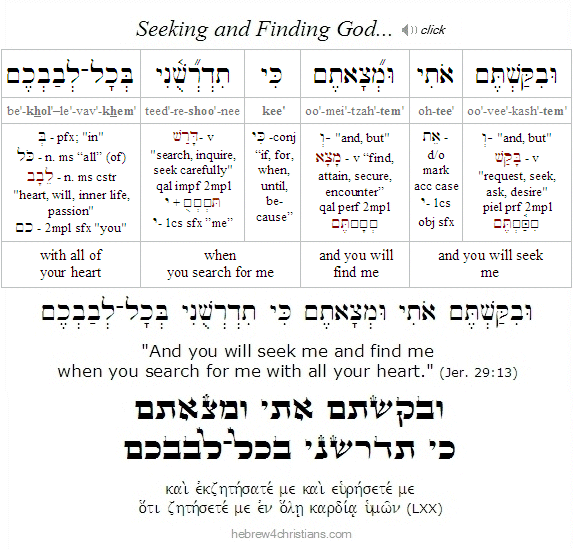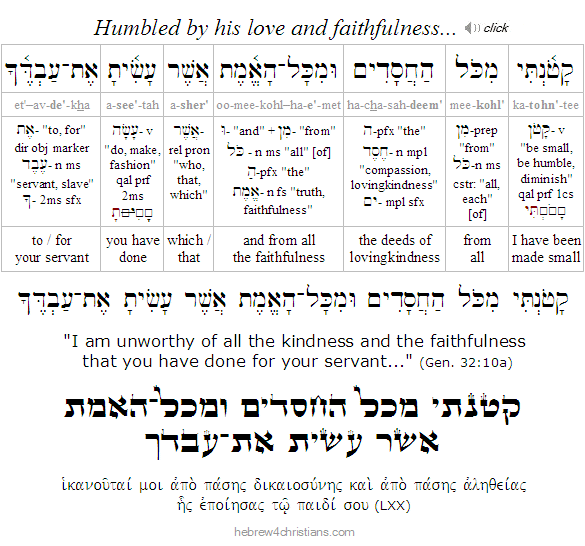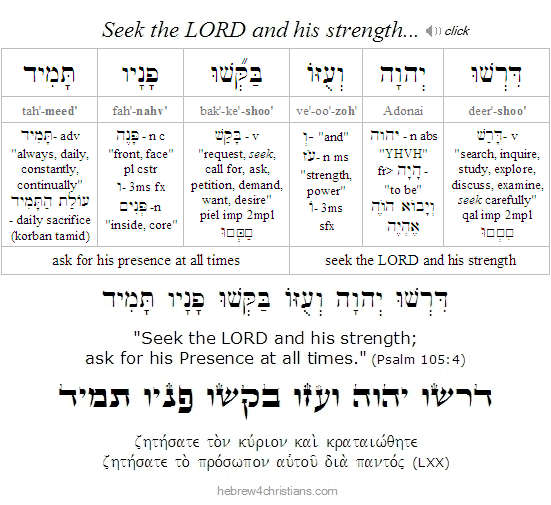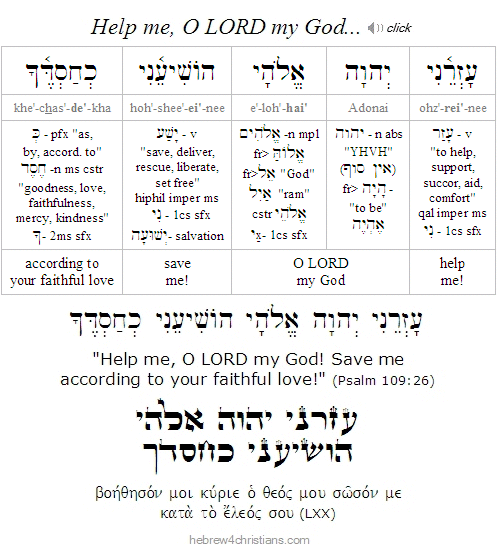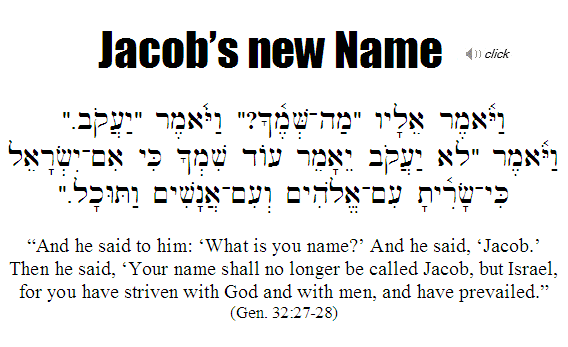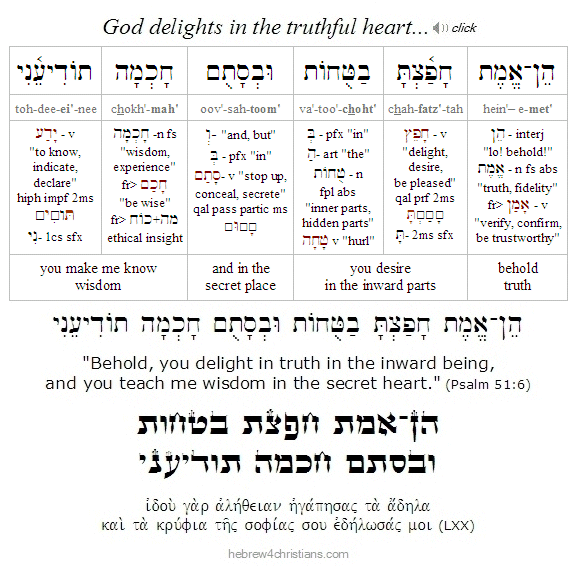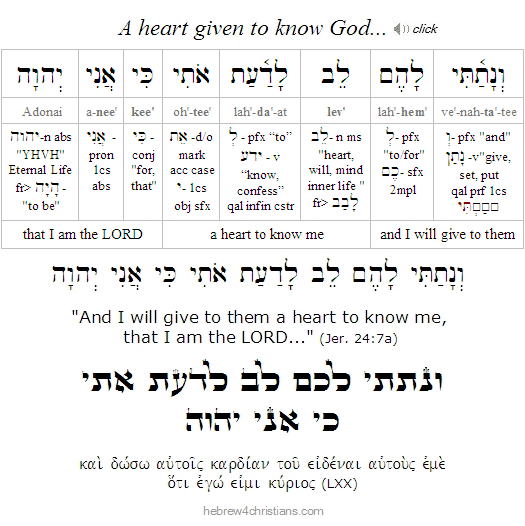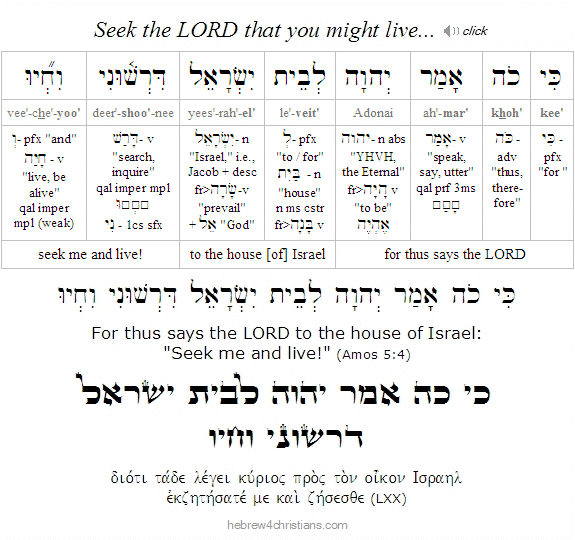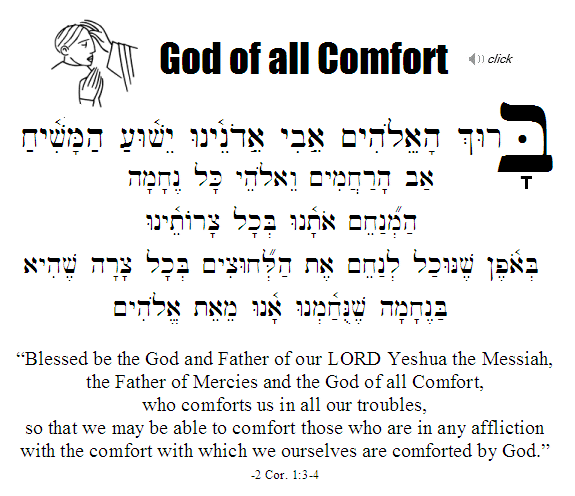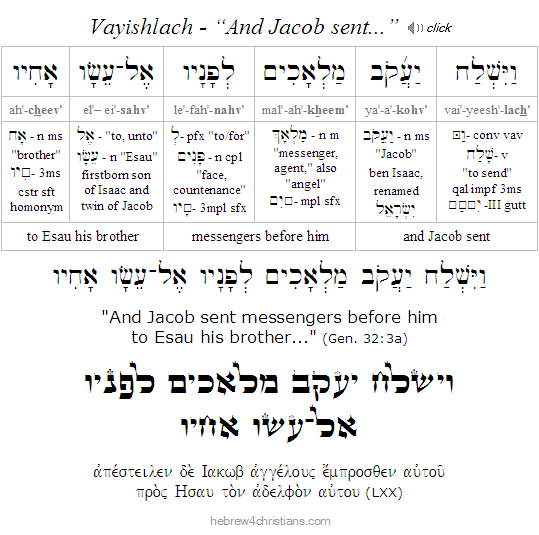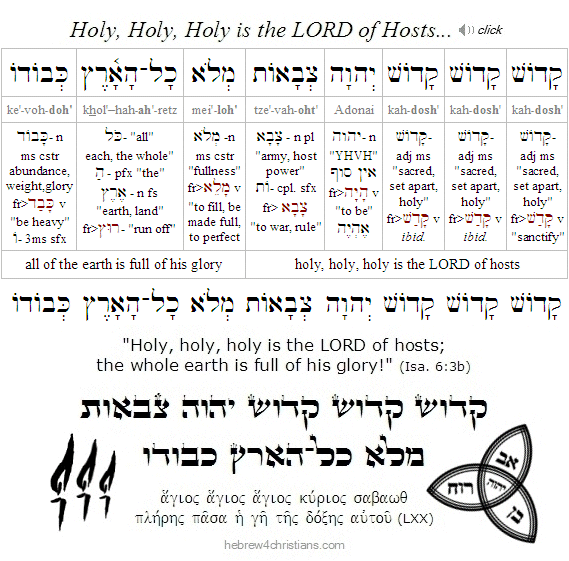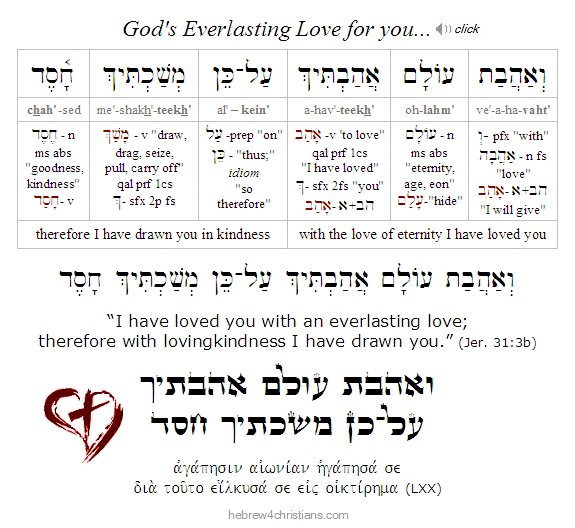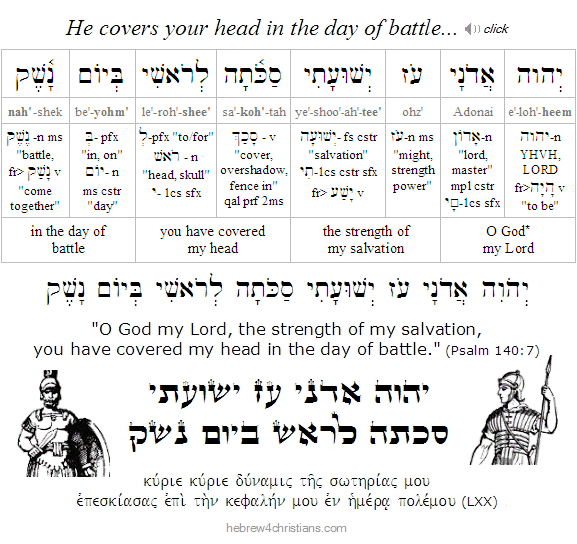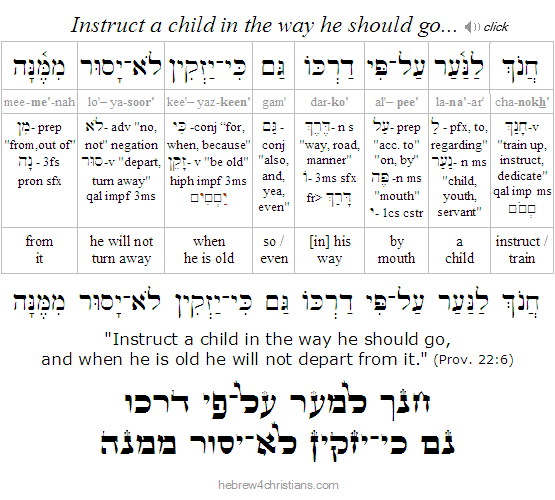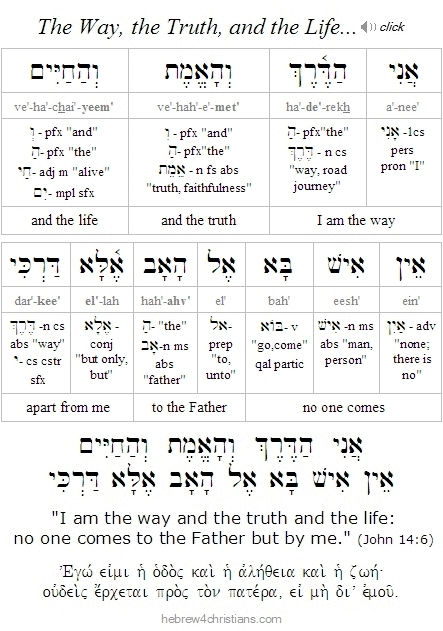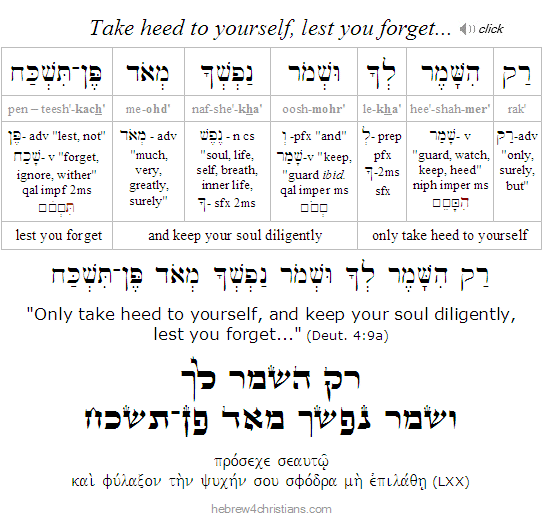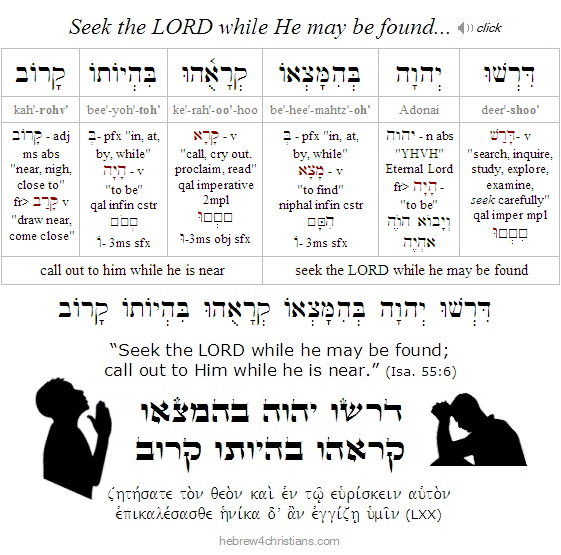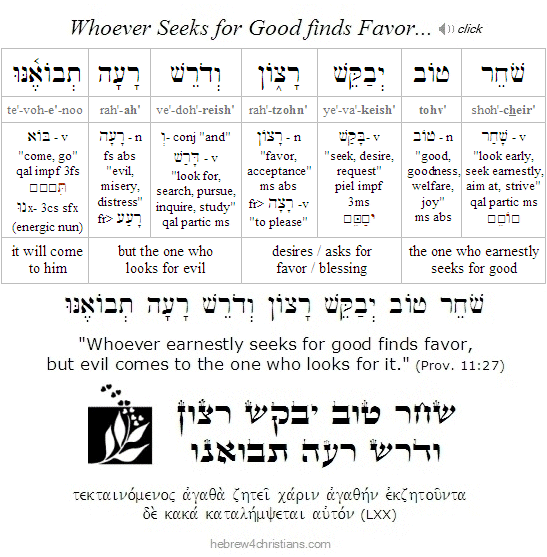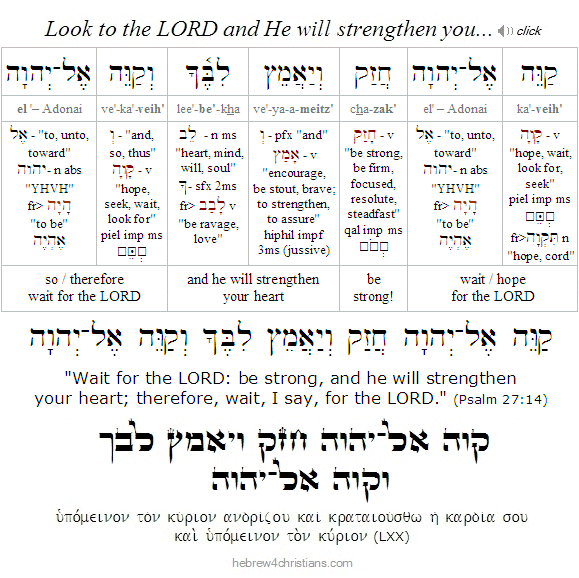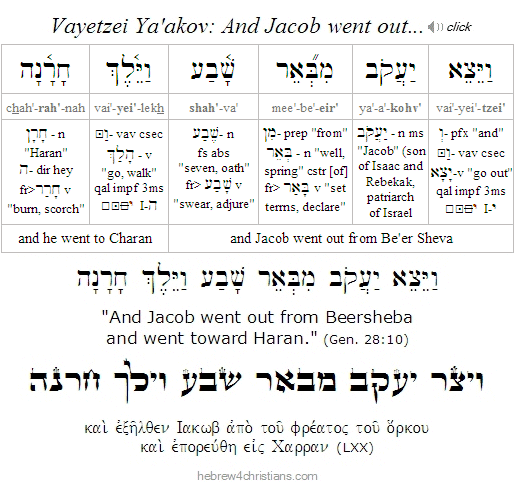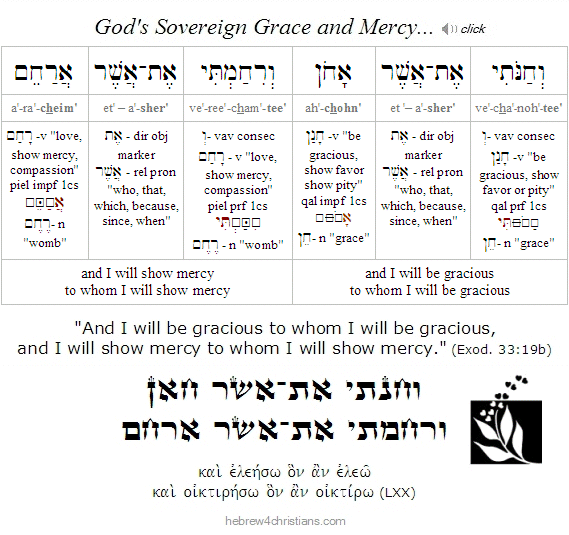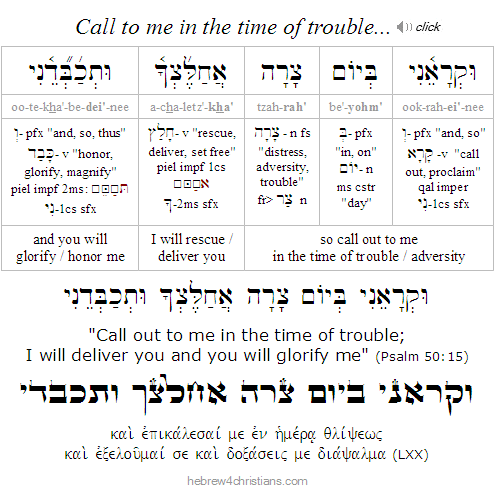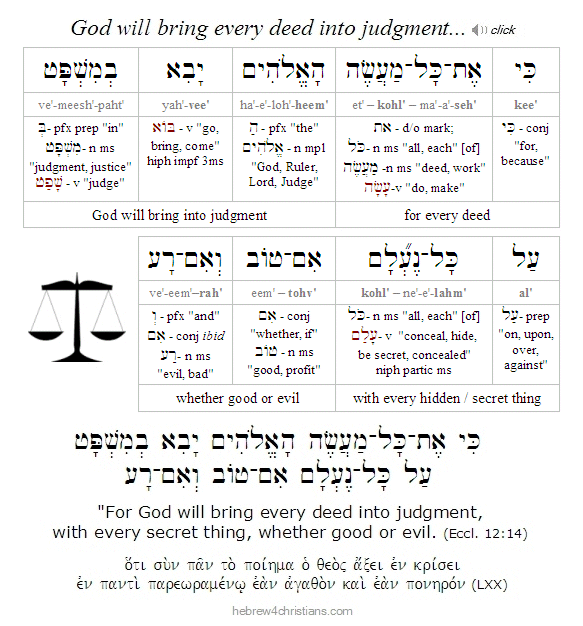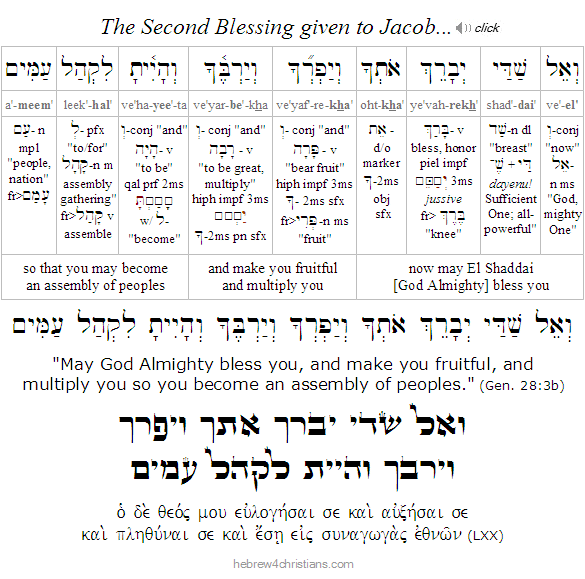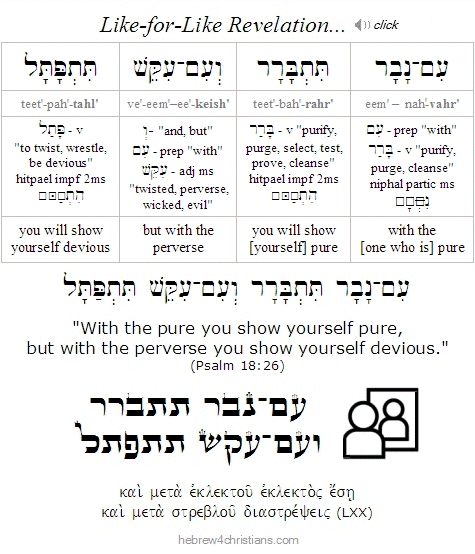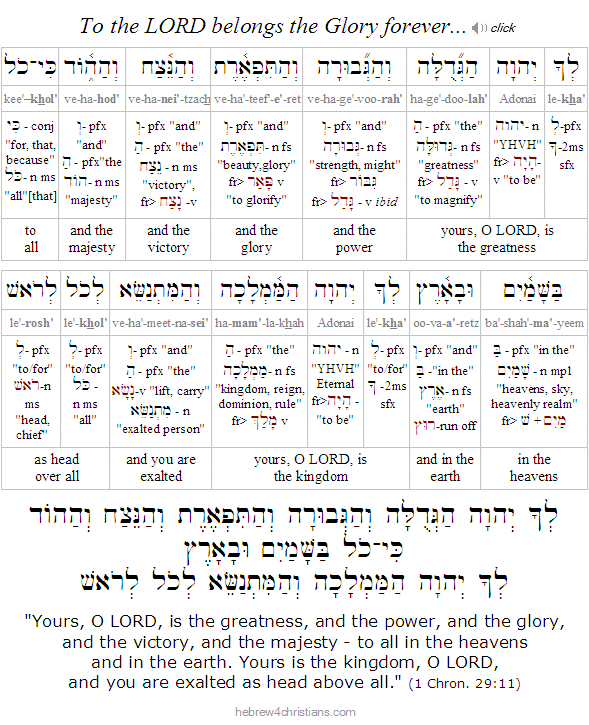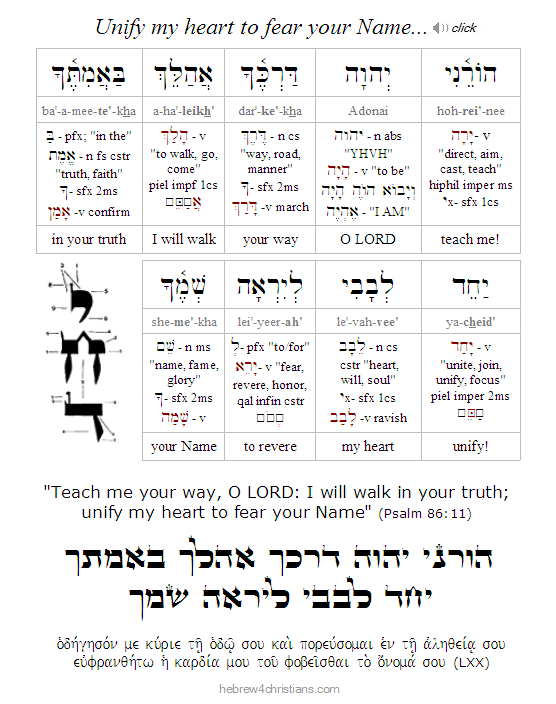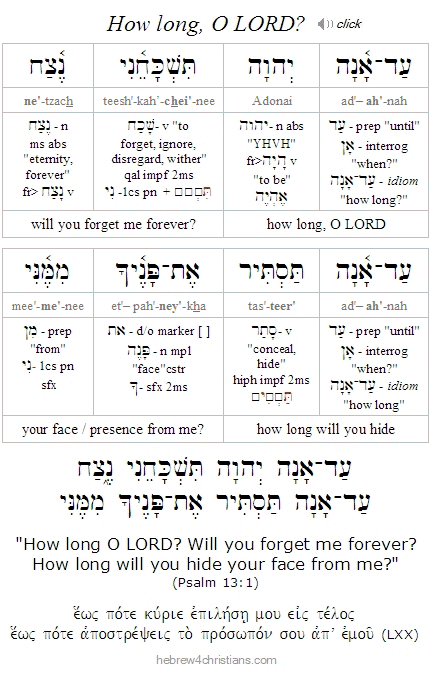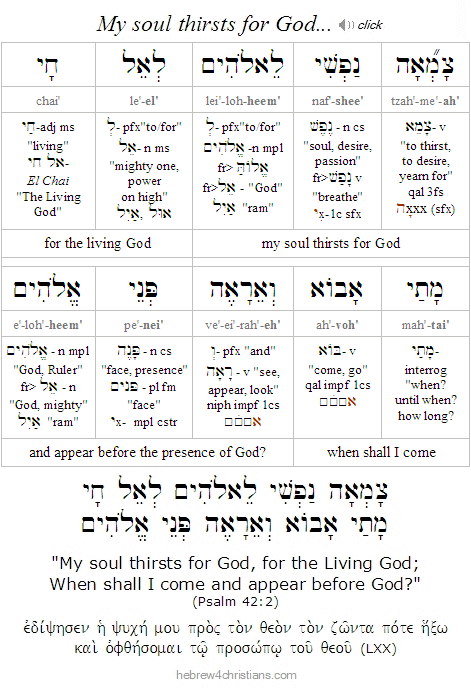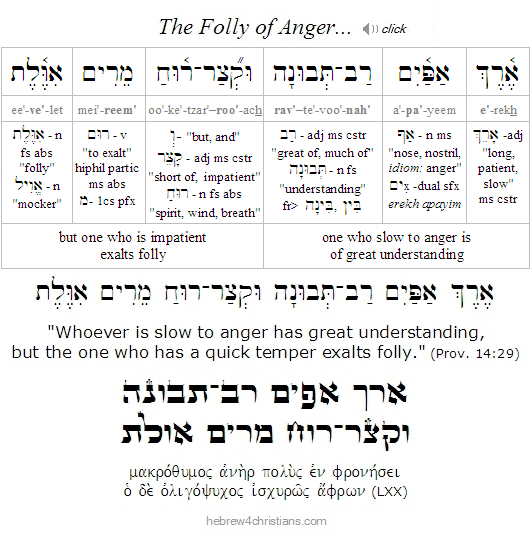|
Jewish Holiday Calendar
For November 2021 site updates, please scroll past this entry....
The Torah divides the calendar into two symmetrical halves: the Spring and the Fall, indicating the two advents of Messiah. The Biblical year officially begins during the month of the Passover from Egypt (called Rosh Chodashim, see Exod. 12:2), and the spring holidays of Passover, Unleavened Bread, and Firstfruits both recall our deliverance from Egypt and also our greater deliverance given by means of the death, burial, and resurrection of the Messiah, the great Passover Lamb of God. Yeshua was crucified on erev Pesach, buried during Unleavened Bread, and was resurrected on Yom Habikkurim (Firstfruits). The holiday of Shavuot (i.e., "Pentecost") both commemorates the revelation of the Torah at Sinai as well as the revelation of the Ruach HaKodesh (Holy Spirit) at Zion, in fulfillment of the promise given by our Lord....
The intermediate months of summer end with the advent of the sixth month of the calendar, called the month of Elul, which recalls the time Moses interceded on behalf of Israel after the sin of the Golden Calf. To commemorate this time of our history, we likewise focus on teshuvah (repentance) in anticipation of Rosh Hashanah and especially in anticipation of Yom Kippur, the great "Day of Atonement." In Jewish tradition the 30 days of Elul are combined with the first ten days of the seventh month (called the "Days of Awe") to set apart "Forty Days of Teshuvah" leading up to the Day of Forgiveness for Israel. Immediately following Yom Kippur, the mood changes as we begin preparing for a joyous week-long celebration called Sukkot (i.e., "Tabernacles") that concludes with the holiday of Simchat Torah.
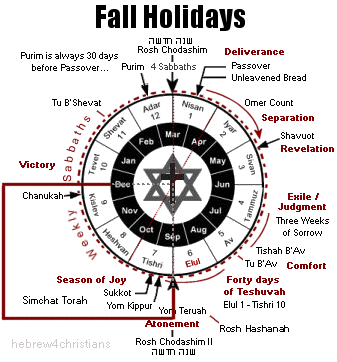 |
The Fall Holidays:

The fall festivals prophetically indicate the Day of the LORD, the second coming of Yeshua, the great national turning of the Jewish people, and the establishment of the reign of the Messiah upon the earth during the Millennial Kingdom in the world to come.
Note that in accordance with tradition, holiday dates begin at sundown. Moreover, some holidays may be postponed one day if they happen to fall on the weekly Sabbath:
1. Month of Tishri (Mon. Sept. 6th [eve] - Tues. Oct. 5th [day]) - Fall holidays here!
2. Month of Cheshvan (Tues. Oct. 5th [eve] - Thurs. Nov. 4th [day])
- Four Sabbaths: Noach, Lekh-Lekha, Vayera, Chayei Sarah
- Yom Ha'Aliyah - Honoring Israel's immigrants (Wed. Oct. 13th; Cheshvan 7)
- Sigd - 50th day after Yom Kippur; Ethiopian Jewish holiday Wed. Nov. 4th)
3. Month of Kislev (Thurs. Nov. 4th [eve] - Fri. Dec. 3rd [day])
- Four Sabbaths: Toldot, Vayetzei, Vayishlach, Vayeshev
- Chanukah: Sun. Nov. 28th - Mon. Dec. 6th
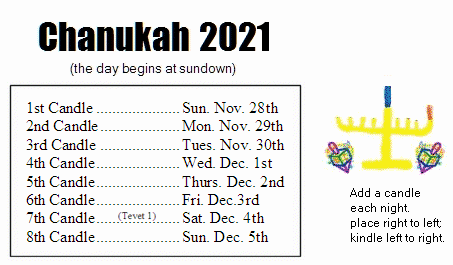
- Dates for Chanukah 2021 (5782):
- 1st Chanukah candle - Sun. Nov. 28th [i.e., Kislev 25]
- 2nd Chanukah candle - Mon. Nov. 29th [i.e., Kislev 26]
- 3rd Chanukah candle: Tues. Nov. 30th [i.e., Kislev 27]
- 4th Chanukah candle: Wed. Dec. 1st [i.e., Kislev 28]
- 5th Chanukah candle: Thurs. Dec. 2nd [i.e., Kislev 29]
- 6th Chanukah candle: Fri. Dec. 3rd [i.e., Kislev 30]
4. Month of Tevet (Fri., Dec. 3rd [eve] - Sun. Jan. 2nd [day])
- Four Sabbaths: Miketz, Vayigash, Vayechi, Shemot
- Dates for Chanukah (continued):
- 7th Chanukah candle: Sat. Dec. 4th [Tevet 1 - Chodesh Chanukah]
- 8th Chanukah candle: Sun. Dec. 5th [Tevet 2] Zot Chanukah
- Asarah B'Tevet - Tues. Dec. 14th (dawn), 2021; fast over the seige of Jerusalem
- Christmas - Sat. Dec. 25th (Tevet 21, 5782)
- Secular New Year: Sat. Jan. 1st, 2022 (Tevet 28, 5782)
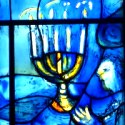 |
Note: For more about the dates of these holidays see the Calendar pages....
November 2021 Updates
Essence of Chanukah...
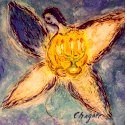
[ The eight-day Festival of Chanukah runs from Nov. 28th - Dec. 5th this year... ]
11.29.21 (Kislev 24, 5782) The essence of Chanukah is simply to receive the light, to bear witness of the radiance of God's victory. We celebrate the work of God, his salvation, and the triumph of his love. Therefore its message is "wake up, open your eyes, and believe" the good news: darkness and despair will not prevail; your mourning will find comfort, your grief its solace. Your heart's deepest longing shines brightly, even now, if you will but believe... With God's help, fight the darkness of fear...
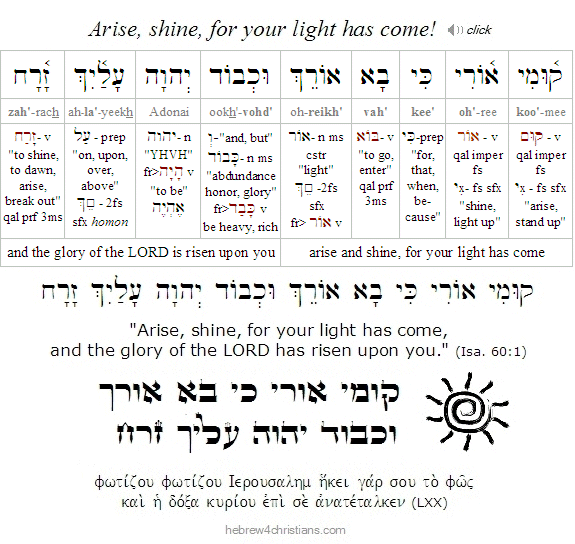 |
The LORD said to Moses from the midst of the shining flame: 'Take off your sandals from your feet, for the place on which you stand is holy' (Exod. 3:5). The Chofetz Chaim comments: We all need to rise higher... Never say, I will be able to lift myself up at another time or different place. By faith see that this place, right now, is holy ground, and awaits your response. May God open the "eyes of your heart" to help you see (Eph. 1:18-19).
The Source of Light...
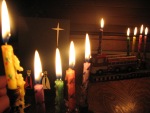
[ Chanukah begins this evening after sundown... Happy Holidays, friends! ]
11.28.21 (Kislev 23, 5782) "God is Light; in Him there is no darkness at all" (1 John 1:5). Yeshua said: "I am come a light into the world, that whoever believes in me should not abide in darkness" (John 12:46). The ultimate message of Chanukah is eschatological and full of hope. This world is passing away and the Kingdom of Heaven will one day be established upon the earth. We live in light of this blessed hope (Titus 2:11-13). The world's rulers are "on notice" from God Almighty: their days are numbered and they will surely face the judgment of the LORD God of Israel (Psalm 2). We must stand against evil by refusing to conform to the world around us (Eph. 6:11-18). Now is the time. "Let your light so shine before others that they may see your good works and give glory to your Father who is in heaven" (Matt. 5:16). Followers of Yeshua are made part of His Dwelling - extensions of His Presence in this dark world - and during this Chanukah season may we remember the call to rededicate our lives to Him! יְהִי אוֹר - May your light shine!
Hebrew Lesson:
Psalm 36:9 Hebrew reading:
Parashat Miketz - מקץ
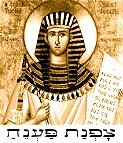
[ The eight days of Chanukah run from Sunday, Nov. 28th (i.e., Kislev 25) through Sunday, Dec. 5th this year. The weekly Torah reading is not suspended for Chanukah (as it is for Passover and Sukkot), though additional Torah readings are read for each of the eight days of the holiday... ]
11.28.21 (Kislev 23, 5782) In our Torah portion for Chanukah week, we will read how Joseph successfully interpreted Pharaoh's dreams and rose to power in Egypt. Because of a famine in the land of Canaan, however, his brothers came to Egypt in search of food. A disguised Joseph then tested his brothers to see whether they were the same people who had callously sold him into slavery, or whether they had undergone teshuvah (repentance).
The eventual revelation of Joseph and his reconciliation with his brothers is a prophetic picture of acharit ha-yamim (the "End of Days") when Israel, in Great Tribulation, will come to accept Yeshua as Israel's true deliverer. Presently, the veil is still over the eyes of the Jewish people and they collectively regard Yeshua as an "Egyptian" of sorts. In this connection, I list some of the ways that Joseph is a "type" or foreshadowing of the coming Yeshua as the Suffering Servant (see "Mashiach ben Yosef").
Hebrew Lesson:
Genesis 41:1a Hebrew Reading (click):
Keep on Trusting...
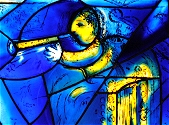
[ Though he slay me, I wil trust in him... ]
11.25.21 (Kislev 21, 5782) When Yeshua said, "Let not your heart be troubled... I go to prepare a place for you" (John 14:1-2), he was assuring us that he had matters well under his control, and therefore we need not worry, since his passion rendered our salvation completely secure... The future is a "prepared place" for you, even if life in this world is often marked by testing and various refining fires. God has not promised to rescue us according to our own schedule, however, so if it appears that your prayers are not immediately answered, keep waiting in faith: "Rejoice, even if you have been grieved by various trials, because the tested genuineness of your faith -- more precious than gold that perishes though it is tested by fire -- may result in praise and glory and honor at the revelation of Yeshua the Messiah" (1 Pet. 1:6-7). God works "all things together for good," and since the exercise of faith is your good, he engineers all things to build your faith. "For my thoughts are not your thoughts, neither are your ways my ways, says the LORD" (Isa. 55:8).
Recall the words: "Let him who walks in darkness and has no light trust in the name of the LORD and rely on his God" (Isa. 50:10). Trusting in God (i.e., bittachon - בִּטָּחוֹן) doesn't mean that we are obligated to say this is "the best of all possible worlds," though it does mean we believe that eventually God will wipe away every tear and make all things right... Bittachon is a word for this world, which says, "Though he slay me, I will trust in him..." Those who call upon the LORD can trust not only in concealed good behind ambiguous appearances ("all things work together for good") but also in a future, real, substantive good that will one day be clearly manifest for us all... We fight the "good fight" of faith, which is a worthy struggle that eventually is realized for blessing. Meanwhile, may the LORD our God keep us from such depth of sorrow that leads to sickness, darkness and despair. Amen.
בטחו ביהוה עדי־עד
כי ביה יהוה צור עולמים
beet·choo · va·Adonai · a·dei–ad
kee · be·Yah · Adonai · tzoor · oh·lah·meem

"Trust in the LORD forever,
for in Yah the LORD is everlasting strength."
(Isa 26:4)

Hebrew Lesson:
Isaiah 26:4 Hebrew Reading:
The last promise of Scripture is "I come quickly" (אֲנִי בָא מַהֵר) and the last prayer is, "Amen, come, Lord Yeshua" (אָמֵן בּאָה־נָּא הָאָדוֹן יֵשׁוּעַ) [Rev. 22:20]. Meanwhile we "inwardly groan" for the fulfillment of our redemption, since presently we are suspended between worlds, walking in hope yet subject to the vanities that befall all flesh... And though God may tarry, He declares, "I am the LORD; in its time I will hasten it" (Isa. 60:22). So we are made captives to hope, clinging to the promise of our ultimate healing and redemption. Our hearts therefore affirm that God is faithful "to keep you from falling, and to present you faultless before the presence of his glory with exceeding joy" (Jude 1:24). Amen. God will help us before He will help us, and may He come speedily, and in our day....
Hebrew Lesson:
Psalm 23:4a Hebrew Reading:
Gratitude and Seeing...

[ Happy Thanksgiving, friends. Despite contracting Covid, I put my trust in the LORD... ]
11.24.21 (Kislev 20, 5782) Gratitude is essential to the life of faith... We read in the Torah: "And you shall bless the LORD your God for the good" (Deut. 8:10). Whenever we derive benefit or enjoyment from something we are to bless (i.e., thank) God for his goodness. Indeed the Hebrew term for gratitude is hakarat tovah (הַכָּרַת טוֹבָה), a phrase that means "recognizing the good." The heart looks through the eye, and therefore how we see is ultimately a spiritual decision: "If your eye is "single" (i.e., ἁπλοῦς, sincere, focused)," Yeshua said, "your whole body will be filled with light" (Matt. 6:22). When we see rightly, we are awakened to God's Presence in the little things of life, those small miracles and "signs and wonders" that constantly surround us. The good eye of faith sees hundreds of reasons to bless God for the precious gift of life (1 Cor. 10:31) - even in times of testing...
"Give thanks to the LORD for He is good; his love endures forever" (Psalm 136:1); "give thanks to the LORD always" (Col. 3:17; Eph. 5:20; 1 Thess. 5:18)... Gratitude is foundational to our lives as followers of Yeshua. Indeed there are really only two prayers we ever offer to God, namely "Help, LORD!" and "Thank you, LORD." Meister Eckhart once remarked that if the only prayer you said in your entire life was, "thank you," that would suffice... Genuine prayer ultimately resolves to an expression of thanks. We are to "praise the Bridge that carries us over" into the Presence and Love of God, and that Bridge is Yeshua our Lord.
The "thank offering" mentioned in the Torah (i.e., zevach ha-todah: זֶבַח הַתּוֹדָד) is also mentioned in the New Testament. In the Book of Hebrews were are instructed to "continually offer up a sacrifice of thanks (זֶבַח תּוֹדָה) to God, that is, the fruit of lips that acknowledge his Name" (Heb. 13:15). It is interesting to note that the Greek verb used to "offer up" (i.e., ἀναφέρω) is used to translate the Hebrew verb "to draw near" (karov) in Leviticus. In other words, the "offering up of thanks" for the sacrifice of Yeshua functions as "korban" and draws us near to God. Thanking God for personal deliverance constitutes "right sacrifices" (זִבְחֵי־צֶדֶק) as we draw near to God in the hope of His love (Psalm 4:5; Heb. 7:19).
Hebrew Lesson:
Psalm 103:1 Hebrew Reading:
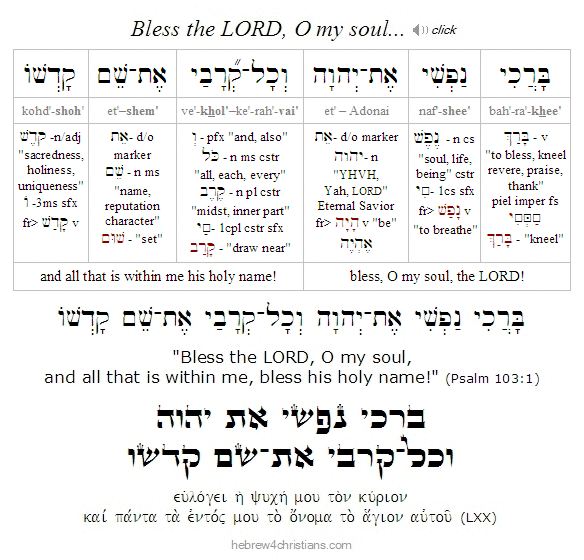 |
Thanksgiving and Sukkot...
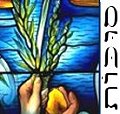
11.23.21 (Kislev 19, 5782) The American holiday of Thanksgiving (חַג הַהוֹדָיָה) likely has its roots in the Jewish tradition of giving thanks to God, and some historians believe that the early "pilgrims" actually derived the idea for the holiday from the Biblical festival of Sukkot (i.e., "the feast of Tabernacles"). Before fleeing to the "New World," the pilgrims lived for a decade among the Sephardic Jews in Holland, since Holland was considered a safe haven from religious persecution at the time. Since the pilgrims were devout Calvinists and Puritans, their religious idealism led them to regard themselves as "new Israel," and it is likely that they learned that Sukkot commemorated the people of Israel's deliverance from their religious persecution in ancient Egypt at that time. After they emigrated to the "Promised Land" of America, it is not surprising that these pilgrims may have chosen the festival of Sukkot as the paradigm for their own celebration. As the Torah commands: "Celebrate the feast so that your generations may know that I made the people of Israel dwell in booths when I brought them out of the land of Egypt: I am the LORD your God" (Lev. 23:39-43). The highly devout pilgrims regarded their perilous journey to the new world as a type of "Exodus event" and therefore sought the appropriate Biblical holiday to commemorate their safe arrival in a land full of new promise...
It is interesting to note that the Hebrew word for "turkey" is tarnegol hodu (תַּרְנְגוֹל הוֹדו), literally, "Indian chicken," which is often shortened to hodu (הוֹדוּ). It is a happy coincidence that we customarily eat turkey on Thanksgiving, and this reminds us of the "thanks" connection: "Give thanks (hodu) to the Lord for he is good," for His love endures forever."
הודו ליהוה כי־טוב
כי לעולם חסדו
hoh·doo · la·Adonai · kee-tohv
kee · le·oh·lahm · chas·doh

"Give thanks to the LORD for He is good;
for His love endures forever."
(Psalm 136:1)

Hebrew Lesson:
Psalm 136:1 Hebrew Reading:
Note: For more on this subject, see "Thanksgiving and Sukkot."
Prayer request for healing...

11.21.21 (Kislev 17, 5782) After Olga received a flu vaccine recently, she developed Covid, and now I have it as well. We are extremely tired; unable to work; high fever, body aches, etc. I have respiratory issues as well which is a concern. Your prayers are appreciated. No fear: God is in control of our lives. We will get through this one way or another (Rom. 14:18).
Parashat Vayeshev - וישב
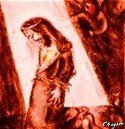
[ In our Torah for this week we read how Joseph's jealous brothers stripped him of his "coat of many colors" and threw him into a pit -- a providential event that eventually led to the deliverance of the Jewish people by the hand of a "disguised savior." Indeed, the life of Joseph foreshadowed the two advents of Yeshua our Messiah: first as Israel's Suffering Servant and second as the national deliverer of the Jewish people during the time of great tribulation... ]
11.21.21 (Kislev 17, 5782) Last week's Torah (i.e., parashat Vayishlach) recounted how Jacob had wrestled with a mysterious Angel before returning to the Promised Land to be reconciled with his brother Esau. This week's portion (i.e., parashat Vayeshev) begins with Jacob living back in the land promised to Abraham and Isaac with his 12 sons, but the narrative quickly turns to Jacob's favorite son Joseph, who was seventeen years old at the time. The Torah states that Jacob loved Joseph more than all his other sons since he was "the son of his old age," and he was the firstborn son of his beloved wife Rachel. Indeed, Jacob made him an ornamented tunic to indicate his special status in the family.
As the favored son, Joseph's job was to oversee the activities of Jacob's concubines sons (Dan, Naphtali, Gad, and Asher) and to bring "reports" about their activities back to Jacob. However, this role as the overseer and "favored son" was too much for the other brothers, and they became jealous of him and hated him. To make matters worse, Joseph related two dreams to his brothers that foretold that he was destined to rule over them, increasing their envy and hatred of him (the implication of the dreams was that all of Jacob's family would become subservient to him). Jacob rebuked Joseph for arousing his brothers' hatred, but he inwardly took note and waited for the fulfillment of the dreams.
The portion records that one day the brothers went out to pasture their herds, but when they saw Joseph coming to check on them, they conspired to kill him, though later they decided to sell him to some slave traders instead. The brothers then staged Joseph's death by dipping his special tunic into goat's blood and bringing it to their father, who was deceived into thinking that Joseph had been killed by a wild animal.
Meanwhile Joseph was purchased at a slave trade by Potiphar, a captain of Pharaoh's guard. The LORD was "with Joseph," however, and blessed everything he did. In fact, soon he was promoted to be the head of Potiphar's entire household affairs. Potiphar's wife then began enticing Joseph to have an affair with her, and though he steadfastly refused her advances, she later falsely accused him of attempted rape. Potiphar was understandably outraged (at his wife?) and threw Joseph into the royal prison, but again God showed him favor there and soon was appointed to a position of authority in the prison administration.
The portion ends with two prophetic episodes in Joseph's life that eventually would bring him to the attention of Pharaoh himself. While in prison, Joseph met Pharaoh's wine steward and chief baker, both incarcerated for offending their king (according to Rashi, a fly was found in the goblet prepared by the butler, and a pebble in the baker's confection). Both men had disturbing dreams which Joseph correctly interpreted; in three days, he told them, the wine steward would be released but the baker would be hanged. Joseph then asked the wine steward to advocate for his release with Pharaoh. Joseph's predictions were fulfilled, but the wine steward forgot all about Joseph.
Hebrew Lesson:
Genesis 37:1 Hebrew reading:
Holiday Alert: Chanukah...

This year the eight days of Chanukah begin on Sunday, November 28th at sundown (1st candle) and will run through Sunday, Dec. 5th (until sundown). The tradition is that on the first night of Chanukah one flame is lit, on the second night two, and so on until the eighth night when eight flames are lit. In this way we remember the 'growth' of the miracle.
Note: I have been very ill the last few days with a high fever and body aches. I am experiencing computer issues as well. Your prayers are appreciated.
Healing from hidden faults...

11.19.21 (Kislev 15, 5782) All of us have unhealed parts, "hidden faults" (נסתרות) of which we are not fully aware. Therefore king David prayed, "Who can discern his errors? cleanse me from secret faults" (Psalm 19:12). We are cleansed by confession, that is, by looking within our hearts to uncover deeper motivations... If we are honest with ourselves we may discover, for example, that we are angry or fearful people, despite how we otherwise wish to regard ourselves. If you find yourself unable to let something go, for instance, some pain or failure of the past, remind yourself that you must do so if you want to move on with your life. Focusing on how things could have been different is to be enslaved to the past. The goal of teshuvah (repentance) is to turn us back to God for life, but to do this, we must be willing to let go of what makes us sick.
Note that the Hebrew word translated "errors" (i.e., שְׁגִיאוֹת) comes from a root word (שָׁגָה) that means to wander, stray, or transgress. The question raised by David is rhetorical: "Who can discern his errors?" No one – apart from divine intervention... David asked to be cleansed from his "secret faults," which are not those that were performed by him "in secret," but rather those that were unknown, unseen, and unconscious to his own sense of awareness. These are "mindless" sins, unthinking offenses, hidden dispositions, character defects and actions that a person unwittingly performs, perhaps because of deep forces of which he was oblivious. These are the "secret sins" set in the light of God's face (Psalm 90:8); the "sluggish darkness" of the human heart that leads to death and ruin: "The heart is deceitful above all things, and incurably sick; who can understand it?" (Jer. 17:9). How many of us, after all, are fully aware of what we are doing when we are doing something? How many of us are completely transparent both to ourselves and before God, with no unclear motives, etc.? We must always be vigilant... There is always the force of habit, or the subconscious desires or conflicts of the inner life, that work on us, not to mention the trauma of our past and the present devices from the enemy of our souls. May the LORD give us the willingness to be healed, even if there are parts of ourselves that seem to resist that healing. Amen.
Hebrew Lesson:
Psalm 19:12 Hebrew reading:
The Aim of Torah...

11.19.21 (Kislev 15, 5782) "Blessed is the person who does not heed the counsel of the wicked, nor take the path of sinners, nor join the company of the insolent; but his delight is the Torah of the LORD (תּוֹרת יהוה), and in his Torah he meditates day and night" (Psalm 1:1-2). Note that the Hebrew word "torah" (תּוֹרָה), often confusingly translated as "law," comes from a verb (יָרָה) that means to aim or direct something to its goal. Torah therefore is a general term suggesting direction, focus, volition, training, instruction, or guidance as imparted by a teacher.
Now since the Torah of the LORD is comprised of sacred words spoken to guide our souls, its synonym is rightly called the Word of God (דּבר יהוה), the Agency that reveals heavenly truth to the heart of faith, as it says: "The Word of God is living and active, sharper than any two-edged sword, piercing to the division of soul and of spirit, of joints and of marrow, and discerning the thoughts and intentions of the heart" (Heb. 4:12). In other words the Torah of the LORD "cuts to the bone," past all the outer layers to connect with the inmost of who and what we are. Torah is therefore not something abstract but intensely personal; its message penetrates and transforms the listening heart, directing it to understand God's passion that is behind the words.
"My child, keep your father's commandment (i.e., mitzvah, "connection"), and do not forsake your mother's instruction (i.e., Torah, guidance); bind them over your heart; fasten them around your neck. When you walk about, they will guide you; when you lie down, they will watch over you; when you wake up, they will talk to you. For the commandment (mitzvah) is like a lamp, instruction (Torah) is like a light, and rebukes of discipline (musar) are like the road leading to life" (Prov. 6:20-23). Dear LORD, help us to love your Torah and meditate upon it all day long (Psalm 119:97).
Hebrew Lesson:
Psalm 119:97 Hebrew reading:
Mystery and Humility...

11.19.21 (Kislev 15, 5782) Though it is important to guard our sincere convictions and to be passionate about what we believe, we must nevertheless be careful to walk in humility before the mystery of life... After all, much is inscrutable to us, much is beyond our understanding, and therefore, if we are honest, we should be reverent before the "sacred secrecy" of everything. Fanaticism and intolerance (whether secular or religious) is motivated by willful ignorance of the marvelous complexities that pervade existence. The fanatic invariably seeks to reduce life to a simple formula, recipe, and a generalization. The humble person, on the other hand, freely confesses that they "walk by faith, not by sight" -- by hearing the Word of God and heeding what the Spirit of God is saying to the heart...
For now we "see through a glass darkly," which literally means "in an enigma" (ἐν αἰνίγματι). An enigma (or riddle) is an analogy given through some resemblance to the truth, though quite often the correspondences are puzzling and obscure. Hence, "seeing through a glass darkly" means perceiving obscurely or imperfectly, looking "through" something else instead of directly apprehending reality. We see only a reflection of reality, and our knowledge in this life is indirect and imperfect. This is contrasted with the "face to face" (פָּנִים אֶל־פָּנִים) vision and clarity given in the world to come, when our knowledge will be clear and distinct, and the truth of God will be fully manifest and no longer hidden. Being "face to face" with reality means being free of the riddles, the analogies, the semblances, etc., which at best adumbrate our way..
Such reflection should make us humble whenever we share our faith. "Now we know in part, but then shall we know in whole" (1 Cor. 13:12). Let therefore repeat that an honest theology must find a place for mystery, for "seeing through a glass darkly," and for the apprehension of awe and wonder.
"There was a time when I had all the answers. My real growth began when I discovered that the questions to which I had the answers were not the important questions.... A genuine faith must recognize the fact that it is through a dark glass we see; though by faith we do penetrate sufficiently to the heart of the mystery so as not to be overwhelmed by it. A genuine faith resolves the mystery of life by the mystery of God. It recognizes that no aspect of life or existence explains itself, even after all known causes and consequences have been traced. All known existence points beyond itself. To realize that it points beyond itself to God is to assert that the mystery of life does not dissolve life into meaninglessness...." (Reinhold Niebuhr)
Since the LORD God is called the Infinite One (אֵין סוֹף) whose understanding is without limit (Psalm 147:5), we must use analogies, metaphors, symbols, allusions, parables, poetry, and other linguistic devices (as well art and music) to convey spiritual truth and meaning. We compare (συγκρίνω) spiritual things with spiritual (1 Cor. 2:13). Some of the classical "mystics" have said the way to God is through the transcendence of words altogether, though most of them use imagery and poetry to speak about "ineffable" reality. Others, like Soren Kierkegaard, use "indirect communication" to evoke the decision to believe, to find hope, and to walk by faith. The truth can be found, not by means of humanistic learning, but by special revelation and encounter with the Truth of God.
Hebrew Lesson:
Psalm 147:5 Hebrew reading:
For more on this topic, see "Mystery and Humility: Living in the Divine Connection."
Torah of Wresting...
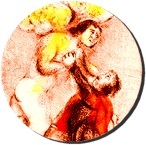
11.18.21 (Kislev 14, 5782) Yeshua warned those who professed faith: "Not everyone who says to me, 'Lord, Lord,' will enter the kingdom of heaven, but the one who does the will of my Father who is in heaven. On that day many will say to me, 'Lord, Lord, did we not prophesy in your name, and cast out demons in your name, and do many mighty works in your name?' And then will I declare to them, 'I never knew you; depart from me, you workers of lawlessness'" (Matt. 7:21-23). Despite the practice and profession of their faith, these people were strangers to God... They had a false sense of assurance, believing that they were "serving God" when they were not... So the essential question here is whether Yeshua truly knows you. You may know a lot about God, religion, spirituality, and yet you may remain unknown by him... So where do you find life? What are you loving? Where are you going?
"Not everyone who says to me, 'Lord, Lord,' will enter the kingdom of heaven, but the one who does the will of my Father who is in heaven" (Matt. 7:21). Yet what is the will of the Father but to trust in Messiah for life (John 6:40)? "What must we do, to be doing the works of God?" Yeshua answers: "This is the work of God, that you believe in the One whom he has sent" (John 6:28-29). The Torah of God centers on trusting the Messiah (Titus 3:5-7).
On that day many will say to me, 'Lord, Lord, did we not ... do many mighty works in your name?' And then will I say to them, 'I never knew you; depart from me, you workers of lawlessness' (Matt. 7:22-23). From this we see that good works - even those done in the name of Messiah - are insufficient for life, and that something more is needed... That "something more" is the reality of relationship with him. However, even Yeshua's sacrifice on the cross can't bring you into relationship with him apart from receiving it for your healing... By faith you encounter Yeshua clothed in your flesh, your sin, and suffering death for you. "As long as Christ remains outside of us we are separated from him."
Some people feel frightened when they consider all this, but fear arises only if we miss Yeshua's point... Good works can't save you, even those performed in the Savior's name... What saves you is trusting in God's great love for your life: "This is the work of God, to trust in the One whom God has sent [for you]" (John 6:28-29). Genuine salvation is "from the LORD," that is, comes as a result of his loving intervention on your behalf (Titus 3:5-7; Eph. 2:8-10). This is the will of the Father, the true Torah of the LORD, namely, to honor the Messiah and know him by faith... You trust him for eternal life, you believe that he bears your sins, you seek to know his heart, and you desire to share your life with him. It is lawlessness to reject the Torah of the LORD that commands us to follow Messiah and know him in all our ways - including the ways of our struggles, our fears, and so on... Each of us must wrestle alone, in the dark places of fear, to find our new name from God (Gen. 32:24). Is the blessing for you or not? The essential thing is to know (and more importantly) to be known by Yeshua.... It is a matter of trust, of sharing your heart, being real with him, walking with him, loving him... "This is the work of God, to trust in the One whom God has sent [for you]." Trusting in the Lord means accepting that you are truly loved (and made safe) because of who God is...
The gospel is "the power of God for salvation to everyone who believes, to the Jew first and also to the Greek" (Rom. 1:16). It is a miracle of being in a right relationship with God. We are pursued by his love, and he haunts us until we surrender to his will... Like Jonah we first must be "swallowed up" in consciousness of our own rebellion before we realize we are undone, that we are without remedy apart from God's intervention and deliverance. We start there - in the "belly of the fish" - and later are resurrected to go forth by God's mercy and grace. As we look to Yeshua, as we lean on him, he reveals more of himself to us. He gives us the grace and strength we need; he is always enough...
Whether Yeshua is living in you (and you are living in Him) is the most important question of your life upon which everything else turns. The great mystery is "Christ in you, the hope of glory" (Col. 1:27). As Ravenhill once said, "I don't ask people if they're saved anymore; I look them straight in the eye and say, "Does Christ live inside you?" Indeed, He is present right now -- for you -- in this very moment... Are you connected with Him in the truth? Are you drawing life from His life? Do you really live in Yeshua? "God is making his appeal through us. We implore you on behalf of Messiah, be reconciled to God" (2 Cor. 5:20).
Each of us must wrestle alone, in the dark places of fear, to receive our new name from God (see Gen. 32:24). Again I ask: Is the blessing for you or not? Are you willing to be loved and accepted by him? What is your name? What do you call yourself? You cannot know God apart from his love, yet for some people that is exactly where the struggle lies... Look within your heart; test yourself; do you believe God cares for you? Take hold of the promise and do not let go until you know who you are in his love. "To the one who conquers I will give some of the hidden manna, and I will give him a white stone, with a new name written on the stone that no one knows except the one who receives it" (Rev. 2:17).
Repeat these affirmations of faith:
The blessing is there for you, though you might need to wrestle in faith to fully take hold of your identity in Christ. May God help you answer to the new name he calls out to you...
Seeking God's Face...

11.18.21 (Kislev 14, 5782) From our Torah portion this week (i.e., Vayishlach) we read: "And Jacob called the name of the place "the Face of God" (i.e., Peniel: פְּנִיאֵל) saying, "For I have seen God face to face (פּנִים אֶל־פָּנִים), and yet my life has been delivered" (Gen. 32:30). And where did Jacob see God "face to face" except in the struggle of faith, while seeking the blessing, even in the midst of his own inner conflict? And here too may we find the Shining Presence, the Face of God, even in the midst of our troubled lives, as we struggle, refusing to let go until we are taken hold by God's love...
"And Jacob called the name of the place 'Peniel,' translated "the Face of God." The "name of the place" (שֵׁם הַמָּקוֹם) here refers to the heart, the inner sanctuary, which is called the place of God. Where it says, "let them make me a Sanctuary, that I may dwell in their midst" (Exod. 25:8), the text literally reads, let them make me a sanctuary, that I may dwell within them (בְּתוֹכָם), that is, within their hearts. The place (המקום) is therefore the holy ground of the heart; the place within where God's face is disclosed, and where we can apprehend God. It is noteworthy that the Hebrew word for "face," i.e, panim (פָּנִים), is written the same way as the word for "inside," that is, penim (פְּנִים). Indeed the word face comes from a root word panah (פָּנָה) meaning "to turn" (the Hebrew preposition "before," i.e., lifnei (לִפְנֵי) comes from the same root and literally means turning toward or facing something). We can come to "the place of God" when we turn our hearts in respect before what is real and true. "Respect precedes Torah," which means we cannot even begin to experience the Divine Presence apart from honoring the sacred, distinguishing it from the common, and understanding that we owe every fiber of our existence to the One before whom we shall give account (Heb. 4:13). The Spirit promises: "You will seek me and find me, when you seek me bekhol levavkha - with all your heart - and I will be found by you, declares the LORD" (Jer. 29:13-14).
Hebrew Lesson:
Jeremiah 29:13 Hebrew reading:
"With all your heart" -- with both your "good" heart and with your "evil" heart -- that is, with all that is within you do you seek... You don't wait until you are "cleaned up" to reach out to God, but come "just as you are" -- in the midst of the messiness and sin of your life...
Raised from the Dust...

[ The following entry is related to this week's Torah reading, parashat Vayishlach... ]
11.17.21 (Kislev 13, 5782) In his heartfelt appeal to God for help, Jacob prayed: "I have been diminished (קָטנְתִּי) from all the kindness and the faithfulness that you have done for your servant" (Gen. 32:10). Jacob was "made small" through the revelation of God's love and truth, and the focus therefore shifted away from himself to God: "He must increase, but I must decrease" (John 3:30). Jacob's subsequent wrestling with the Angel pictured birth pangs, the throes of his spiritual rebirth. Rashi notes that the word translated "wrestled" (i.e., va'ye'avak: וַיֵּאָבֵק, Gen. 32:24) is related to the idea of "raising the dust" (i.e., avak: אָבָק), which suggests resurrection from the dust. The struggle – the "death match" – was to bury the old Jacob and to raise him up as "Israel," a prince of God the King.
Hebrew Lesson:
Genesis 32:10a Hebrew reading:
Yeshua told us we must "forget ourselves" in order to discover what really matters: "If anyone would come after me, let him deny himself and take up his cross and follow me. For whoever would save his life will lose it, but whoever loses his life for my sake will find it" (Matt. 16:24-25). Note that the phrase translated "deny himself" comes from a Greek verb (ἀπαρνέομαι) that means "to affirm that you have no acquaintance or connection with someone," and is the same verb used when Peter denied the Messiah (from α-, "not," + ῥέω, "to speak"). To deny yourself, then, means to be willing to disregard your own personal interests in a given moment -- to "betray" the selfish impulse that seeks to rule the ego in your daily life. It is a "putting off" of the old nature and a "putting on" of the new (Eph. 4:22-24). Put positively, denying yourself means "forgetting yourself" because you are overwhelmed with God's great love for your soul, and therefore you no longer "know yourself" according to the flesh but according to the Spirit of God (2 Cor. 5:16-17).
Personal Update...
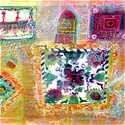
11.17.21 (Kislev 13, 5782) Shalom friends. It's been a battle recently. I was hit by a car while driving to pick up my son from school today, and the driver fled the scene (I am okay, thank God). I've been experiencing some pretty rough issues with my health as well. The ministry has come under attack not only from social media and Google search algorithms that hide its content from view, but also from hackers who have crippled the forum, infiltrated the blog site, and so on. In addition, we learned recently that our Emanuel David ("Manny") has some serious medical issues... Olga is in school full-time and that adds to the mix. I currently operate the ministry from a small room in our house and rarely get out much these days... It was challenging doing ministry for the last 20 years, but the last few years have been exasperating, and sometimes I feel like I just want to climb in bed and pull a blanket up over my head. I won't give up, though, for "woe is me if I don't preach the gospel..."
Of course I realize you are struggling as well, and you may be dealing with greater challenges than I am facing. I don't think I am unique here, chaverim. I am not seeking your pity, just your prayers. I appreciate you taking a moment to listen to me, too.
Sharing like this makes me feel a bit vulnerable... I understand the psychological need people have to regard those in ministry as "put together" and able to lead others effectively, and exposing my weaknesses may undermine your confidence in this ministry. Well let me put your mind at rest immediately: I am not a "super hero" type believer; I have "feet of clay," and stumble every day I live. So please do not put your confidence in me but in the Lord. The blessing of this ministry, I believe, comes not from my efforts here (such as they are) but because of the grace of Yeshua and the prayers of people like you who love the things of the Lord and seek to give Him glory... I am humbled beyond all telling. Thank you for being vessels of the kindness and mercies of the Lord who expresses his heart through you....
Hebrew Lesson:
Psalm 119:81 Hebrew reading:
Appearance and Reality...
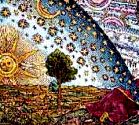
11.17.21 (Kislev 13, 5782) The Hebrew word for "world" or "age" is olam (עוֹלָם), which is derived from a root verb (עָלַם) that means "to conceal" or "to hide." God "hides" His face from us so that we will seek Him, and that means we must press through ambiguity to earnestly take hold of divine truth. Centuries before the time of the philosopher Plato, King David proclaimed that there was a "divided line" between the realm of the temporal world and realm of the hidden and eternal world. The temporal world is finite, subject to change, yet pointed beyond itself to an eternal world, which was the source of real significance, meaning, and life itself (2 Cor. 4:18). Therefore King David said, בַּקְּשׁוּ פָנָיו תָּמִיד/ bakeshu fanav tamid: "Seek His face at all times" (Psalm 105:4). Note that the numerical value for the word "fanav" (i.e., "His face") is the same as that for the word "olam." When we truly seek God's face (i.e., His Presence) we are able to discern the underlying purpose for our lives.
Hebrew Lesson:
Psalm 105:4 Hebrew reading lesson (click):
"Some day I will do it" – is self-deceptive. "I want to do it" – is weak. "I am doing it" – that is the right way. – Rabbi Menachem Mendel of Kotzk
The ancient Greek version of the Torah (i.e., the "Septuagint" or LXX) translates this verse as, "Seek the LORD and be strengthened; seek His face through everything (διὰ παντός)." Unlike Plato, however, who "saw through" the temporal world and regarded it as less than real, King David understood that how we live within the intersection of these two realms reveals our inner character of faith -- and therefore our ultimate destiny....
Blessed Discontent...
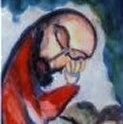
11.16.21 (Kislev 12, 5782) "Love not the world, neither the things that are in the world. If any man love the world, the love of the Father is not in him" (1 John 2:15). The way of faith always represents collision with the world (κόσμος) and its philosophy of the "good life." Happy are those who "hunger and thirst" for righteousness, who refrain from this world and make themselves poor because of inner heartache. For them no amount of the world's pleasures can obscure the difference between what is and what ought to be... This world is at best a corridor to the world to come, a "valley of decision" about what we ultimately choose to believe and to love...The heart of faith looks forward to "the city that has foundations, whose designer and builder is God" (Heb. 11:10).
There is a great danger to become so assimilated into this world that there is no longer any collision, no longer any protest, but merely the whimper of the soul that begs to be left alone from the general toil and troubles of this age... Conscience is seared; natural affections have been abandoned; and the "life" of the soul becomes a mere cipher, a phantom, a ghost... This is the scheme of the worldly dialectic that traps the human soul into living and dying for the sake of sheer vanity. May God help us not to so waste our days... The core prayer of the godly soul is always, "Help me, O LORD my God! Save me according to your steadfast love" (Psalm 109:26). Empty our hearts from vanity, O LORD, and afflict us with hunger and thirst for You, for you alone are what we really need....
Hebrew Lesson:
Psalm 109:26 reading (click):
Telling God your name...

[ The following entry is related to this week's Torah reading, parashat Vayishlach... ]
11.16.21 (Kislev 12, 5782) Some people make it the business of theology to know God's Name, but God begins by first asking for our name instead. Recall that Jacob had disguised who he really was in the hope of obtaining the blessing (Gen. 27), though his duplicity forced him into an exile that lasted until he was finally willing to be honest with himself. And like Jacob, each of us must answer God's question: "What is your name?" (Gen. 32:27). When we "wrestle through" this question to face who we really are, we encounter God and find our blessing, that is, our true identity. Each of us has to go through the process of being renamed from "manipulator" (i.e., Yaakov) to "one in whom God rules" (i.e., Israel). But note the order: it is only when we "tell God our name," that is, own who we really are, that He meets with us "face to face" (Gen. 32:30). You will not be able to say, "I will not let you go unless you bless me," until you are willing tell God your name (Gen. 32:26-27).
Let me add that while "telling God your name" can be painful and even frightening, it is not the last word about who you really are. We are faced with an inner dualism as we struggle to take account of our lives. On the one hand, we need to confess the truth of our sinfulness, brokenness, and so on, while on the other we must endure ourselves and find faith that God's blessing nevertheless belongs to us, despite the mess we've made of our lives.... We have to be willing to accept God's new name for us and to believe that God will miraculously transform our inner nature for good. We are renamed from Yaakov to Israel, though we still know ourselves as both. Jacob was renamed "Israel" but afterward he walked with a limp, seeing both the new and the old natures within him. Jacob still struggled, though his struggle was now focused on walking as God's beloved child in this world: the limp was given to help him lean on the Lord for support.
Part of spiritual growth involves learning to "endure yourself." Many are able, it seems, to receive the hope that they are forgiven for their past sins, but they are subsequently scandalized by encountering their own inner struggles, and they eventually despair over their ongoing weakness... Tragically, some are even tempted to regard the warfare within the heart as a sign of being devoid of all saving grace! We must remember, however, that there is a real struggle between the desires of the flesh and the desires of the Spirit (Gal. 5:17). We must never move away from simple trust in the message of God's unconditional love demonstrated at the cross; we must never seek to legitimize our place in God's heart. When we walk by the Spirit, we are no longer under the law (Gal. 5:18), which is to say, we no longer need to justify ourselves but instead trust in God's power to transform us. Just as we are saved by the love of God, so are we changed, so do we grow.
Hebrew Lesson:
Gen. 32:27-28 reading (click):
Audio Podcast:
Honesty and Deliverance...

11.15.21 (Kislev 11, 5782) "Those who are well have no need of a physician, but those who are sick. I have not come to call the righteous but sinners to repentance" (Luke 5:31-32). Every one of us has a "dark side" or a "shadow self" that has destructive and selfish urges. We try to conceal this truth from others (and even ourselves) but such denial doesn't change the reality within our hearts (Matt. 5:19; Jer. 17:9; Eccl. 9:3). Indeed, when we pretend to be something we are not we are more likely to be overwhelmed by dark forces hidden within us. Paradoxically we most vulnerable when we think we are well, that is, when we deny our sickness our heart and minimize our need for deliverance.
The way of healing is to "own" or confess the truth of our inner condition and to acknowledge the dark passions that sometimes overmaster our best intentions. We must give ourselves permission to allow the hurt, angry, and fearful voices to be heard and sanctioned within us - and then to bring these dark and hidden aspects of our selves before God for healing. The failure to do so will split the soul and cause the hidden aspects of the self to seek "revenge" upon the "parent self" that censors their message. The struggle within our hearts is real and we should attend to it seriously. Denying evil by pretending that we are okay, or by blaming others, blinds us to the truth of our ongoing need for deliverance. May God help each of us to be honest with ourselves and to confess our great need before our Heavenly Father.
Why do we have such difficulty being genuinely honest with ourselves? Despite the fact that we may profess that we are "sinners saved by grace," we often make excuses for our failures, rationalizing that we are not "that bad," and therefore we postpone genuine teshuvah (repentance) and trifle with our spiritual lives. We do this because we feel an almost irresistible need to justify ourselves, to "save face" by pretending that we are not "incurably sick," or by attempting to find something about us that makes feel valuable and worthy. As H.L. Mencken once wittingly noted, "the 'truth' that survives is simply the lie that is pleasantest to believe."
The LORD wants us to be truthful in the "inward being" (Psalm 51:6), though that truth will cost us something, namely whatever worldly gains we might find through self-deception... Opening our hearts to divine examination eventually means colliding with the world of men and their conspiracies, since the godly man no longer abides their presence (Psalm 1:1-2). The Apostle Paul said there was an exclusive disjunction between seeking the approval of men and of the approval of God: "Do I seek to please men? for if I yet pleased men, I should not be the servant of the Messiah (Gal. 1:10). Likewise we are told not to deceive ourselves (lit., "reason around" the truth, from παραλογίζομαι, from παρά, "around, beside" and λογίζομαι, "to reason") by merely hearing the truth of Scripture and not living it (James 1:22). God is not interested in "lip service" any more than he desires heartless sacrifice (Isa. 29:13; Hos. 6:6; Matt. 15:9). "Let your love be genuine (ἀνυπόκριτος, without a "mask" put on), abhor what is evil; cling to what is good (Rom. 12:9). God abhors those who pretend to know Him but who are really spiritual impostors (Matt. 7:21-23; 25:11-12; Luke 6:46).
Tragically (and paradoxically) many people can talk themselves into believing something without really believing it, and that is perhaps the most dangerous thing of all (Matt. 7:22-23). On the other hand, some people can talk themselves into believing (or accepting) something that they know is untrue (or morally wrong), and that self-deception leads to inner fragmentation, chaos, and dissolution of character. A "double-minded man is unstable in all his ways" (James 1:8). As I have said before, the word translated "double-minded" is dipsuchos (δίψυχος), a word formed from δίς, "twice" and ψυχή, "soul." The word describes the spiritual condition of having "two souls" that both want different things at once -- a state of inner contradiction and ambivalence.
Hebrew Lesson:
Psalm 51:6 reading (click):
Thank the LORD our God that there is real healing for our inner dividedness, ambivalence, and double-mindedness, but that healing demands rigorous honesty. As Kierkegaard rightly observed: "No person is saved except by grace; but there is one sin that makes grace impossible, and that is dishonesty; and there is one thing God must forever and unconditionally require, and that is honesty." Therefore we are instructed to confess our faults one to another, and pray for one another, that we may be healed (James 5:16). May the LORD our God help each of us to be wholehearted in our devotion to Him.
A Closing Thought...
Finally, friend, a closing thought. Do not despair by thinking that you will never change. Simply enter into the presence of God in Yeshua. That is what "self-denial" means. Turn to God to know his heart. When you do, you receive a heart to know him in return... Believe to see the goodness of the LORD in your midst. Amen.
Jer. 24:7a reading (click):
Wresting the Blessing...

[ The following entry is related to this week's Torah reading, parashat Vayishlach... ]
11.15.21 (Kislev 11, 5782) In our Torah portion for this week (i.e., Vayishlach), we read how Jacob wrestled with a mysterious "Man" until the break of dawn, but refused to let go until he had secured God's blessing (Gen. 32:24-26). This climactic moment marked a "rebirth" experience for Jacob as signified by his new name "Israel" (יִשְׂרָאֵל), meaning "one who has striven (שָׂרָה) with God (אֱלהִים) and prevailed" (Gen. 32:28). It is fascinating to notice that Jacob was not renamed "God-fearer," or "God-lover," or even "Man of faith," but rather "God-wrestler" – one who struggles with God until the blessing comes... As Yeshua said, "Blessed are those who hunger and thirst for righteousness" – that is, for those who struggle and search for truth – "for they shall be filled" (Matt. 5:6). The blessing comes with a wound, however: The limp that Jacob acquired constantly reminded him of his ongoing need for God's help as he walked through this life. "The one who falls on this Stone will be broken to pieces; but when it falls on anyone, it will crush him" (Matt. 21:44).
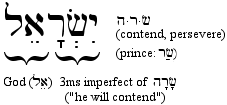 |
So how are you struggling? How does that feed your hunger for God? The characteristically Jewish approach to life is to struggle, to fight, and to ask hard questions until we find out who we really are and what we call ourselves... We can change what has happened in our past by changing what is happening in our present: "For thus says the LORD to the house of Israel: dirshuni vichyu (דִּרְשׁוּנִי וִחְיוּ) - "Seek me and live" (Amos 5:4).
Hebrew Lesson:
Amos 5:4 reading (click):
Torah of Comfort..

11.15.21 (Kislev 11, 5782) "No one ever told me that grief felt so much like fear" (C.S. Lewis). We naturally feel sorrow when we experience loss in our lives, though we may experience a sort of consternation, too, since the very ground beneath our feet may seem to fall away, us leaving us feeling alienated and terribly alone. Over time our grief can make us numb and disconnected. We draw inward, afraid that whatever we love will be taken from us... As someone once confided: "Each loss makes a little hole in you; after awhile, they all add up, and there's just a gaping hole where your heart used to be."
We must go through the desert before we can live the promise. Since experiencing loss is part of life in a fallen world, we must first acknowledge our troubles and sorrows. "Don't call me Naomi ("my delight") but Mara ("bitterness"), for the Almighty has dealt very bitterly with me (כִּי־הֵמַר שַׁדַּי לִי מְאֹד). I went out full, but the LORD hath brought me home empty" (Ruth 1:20-21). Once we give voice to our pain (and that might have to be done over and again) the heart can reopen to hope once again. We then can turn to God and learn to live in the moment, trusting him to help us through the troubles of the day (Matt. 6:34).
"Every time there are losses, there are choices to be made. You choose to live your losses as passages to anger, blame, hatred, depression and resentment, or you choose to let these losses be passages to something new, something wider, and deeper" (Henri Nouwen).
There is a spiritual principle that can help us through our grieving and brokenness. When we care for others who have the same distress we ourselves feel, God will bestow the comfort we give and impart it back to us as well: tefillati al-cheki tashuv (תְּפִלָּתִי עַל־חֵיקִי תָשׁוּב) - "may my prayer return upon my own breast" (Psalm 35:13). "Blessed are the merciful, for they shall obtain mercy" (Matt. 5:7). As we give of our heart in compassion to another, so we will receive compassion in our own brokenness. Indeed we often receive far more than we give when we comfort others in their afflictions and help bind up their wounds. Showing kindness to others who are hurting helps them bear their burdens and so fulfills the law of Messiah (Gal. 6:2). Our wounds fill us the sufferings of Messiah and reveal God's heart of mercy: "Blessed be the God and Father of our Lord Yeshua the Messiah, the Father of mercies and God of all comfort, who comforts us in all our tribulations so that we may be able to comfort those experiencing any trouble with the comfort with which we ourselves are comforted by God" (2 Cor. 1:3-4).
"When we honestly ask ourselves which person in our lives mean the most to us, we often find that it is those who, instead of giving advice, solutions, or cures, have chosen rather to share our pain and touch our wounds with a warm and tender hand. The friend who can be silent with us in a moment of despair or confusion, who can stay with us in an hour of grief and bereavement, who can tolerate not knowing, not curing, not healing and face with us the reality of our powerlessness, that is a friend who cares." (Henri Nouwen: Out of Solitude)
It may seem counterintuitive and even absurd to the everyday mind, but our losses help us discover what really matters in life, and that is a great blessing, a gift... "Blessed are they that mourn." The bereavements of our lives, the small disappointments as well as the major heartaches, teach us to let go and yet keep love alive within us. Life is fleeting, fragile, and precious, and we come to know this in the poignancy and heartache of the moment. When we open our eyes each morning and recite modeh ani, "I confess before You," we have opportunity to believe in God's faithfulness (Lam. 3:22-24). "There are two great days in a person's life - the day we are born and the day we discover why" (William Barclay).
Sometimes there are sorrows and inner wounds that never seem to heal, despite our prayers for mercy and consolation. Then it becomes a matter of faith, that despite our present darkness, healing will ultimately come to us, perhaps when we are in heaven. Faith finds courage to go on living in hope, despite all temporal loss, fear, and abandonment. The groan of your heart is sacred, expressing a wound that binds you to the Healer of your life. "Blessed are they that mourn - for they shall be comforted" (Matt. 5:4). We all must walk through the "valley of the shadow of death" to find hope on its other side, but it is only by passing that way can we know the Name of God as the "I-AM-with-you-always."
"There is nothing that can replace the absence of someone dear to us, and one should not even attempt to do so. One must simply hold out and endure it. At first that sounds very hard, but at the same time it is also a great comfort. For to the extent the emptiness truly remains unfilled one remains connected to the other person through it. It is wrong to say that God fills the emptiness. God in no way fills it but much more leaves it precisely unfilled and thus helps us preserve -- even in pain -- the authentic relationship." - Dietrich Bonhoeffer
Hebrew Lesson:
2 Cor. 1:3-4 reading (click):
Note: For more on this topic, see "The Sickness Unto Life..."
Dates for Chanukah 2021..

11.14.21 (Kislev 10, 5782) On the Biblical calendar the month of Kislev (כִּסְלֵו) is the ninth of the year (counting from Nisan), and also one of the "darkest," with the days progressively getting shorter and the nights getting longer. Indeed, the Winter Solstice often occurs during the last week of Kislev, and therefore the week of Chanukah (which straddles the months of Kislev and Tevet) often contains the longest night of the year. It is no wonder that, among other things, the holiday of Chanukah represents an appropriate time to kindle the lights of faith - and to remember the Light of the World in the Messiah's advent to earth...
 |
The Hebrew word Chanukah (חֲנֻכָּה) means "dedication" and marks an eight day winter celebration that commemorates the victory of faith over the ways of speculative reason, and demonstrates the power of the miracle in the face of mere humanism. Although it is customarily observed as a "Festival of Lights," Chanukah is a "fighting holiday" -- a call to resist the oppression of this world and to exercise faith in the LORD (Rom. 13:12).
This year the eight days of Chanukah will begin on Sunday, November 28th at sundown (1st candle) and will run until Monday, December 5th just before sundown. On the first night of Chanukah one flame is lit, on the second night two, and so on until the eighth night when eight flames are lit. In this way we remember the 'growth' of the miracle.
Parashat Vayishlach...

[ We always read Vayishlach a couple weeks before Chanukah when we connect the vision and ministry of Joseph with that of Yeshua, the Suffering Servant Savior of the world... ]
11.14.21 (Kislev 10, 5782) Our Torah portion this week (i.e., Vayishlach: Gen. 32:3-36:43) contains the famous account of how Jacob "wrestled" with the Angel of the LORD (מַלְאַךְ יְהוָה) just before he encountered his estranged brother Esau. During the "grappling" session (recall the meaning of Jacob's name), the Angel injured Jacob's thigh, but Jacob refused to release his hold until he received the blessing (הַבְּרָכָה). The LORD then asked him, "What is your name (מַה־שְּׁמֶךָ)?" And he said, "Jacob" (i.e., Ya'akov: יַעֲקב). The Angel then replied, "Your name shall no longer be Ya'akov (i.e., "heel holder" [of Esau]) but Yisrael (i.e., "contender with God"), for as a prince (i.e., sar: שַׂר) you have contended (i.e., sarita: שָׂרִיתָ) with God and with men and have prevailed" (Gen. 32:28). This encounter teaches that Jacob finally received the blessing when he refused to let his past determine his spiritual identity and destiny. With God's help he overcame the pain and shame of his past through faith.
Likewise each of us must "go to Peniel" to wrestle with the Angel, just as each of us must be renamed from Ya'akov ("a supplanter") to Israel ("a prince with God"). When the Spirit of Truth asks, "What is your name," may the LORD God grant you the courage to refuse to "let go" until you receive the divine blessing of love and acceptance...
The word vayishlach (וַיִּשְׁלַח) means "and he sent" (from the verb shalach, שׁלח, "to send"). The sages comment that like Jacob, each person of faith is a shaliach (שָׁלִיחַ), or an "emissary" sent out to bear witness to others of the reality and true blessing of God. And may the LORD God of Israel help you, friend, serve as an extension (שְׁלוּחָה) of His loving and gracious Presence to all you may encounter this day.... L'shavuah tov b'Yeshua Adoneinu, chaverim...
Hebrew Lesson:
Genesis 32:3a reading (click):
Hear the Call of Hope...

11.12.21 (Kislev 8, 5782) The only way out of the painful ambiguity of life is to hear a message from the higher world, the Heavenly Voice, that brings hope to our aching and troubled hearts: "Faith comes by hearing the word of Messiah - ῥῆμα Χριστοῦ" (Rom. 10:17). And yet what is the meaning of this message if it is not that all shall be made well by heaven's hand? There is hope, there is hope, and all your fears will one day be cast into outer darkness, swallowed up by God's unending comfort... "Go into all the world and make students (תַּלְמִידִים) of all nations" (Matt 28:19), and that means sharing the hope that what makes us sick - our depravity and despair - has been healed by Yeshua, and that we escape the gravity of our own fallenness if we accept his invitation to receive life in him. "For it is you who light my lamp; the LORD my God will outshine my darkness."
כי־אתה תאיר נרי
יהוה אלהי יגיה חשׁכי
kee -a·tah · tah·eer · nei·ree
Adonai · E·loh·hai · ya·gee'·ah · chosh·kee

"For it is you who light my lamp;
the LORD my God will outshine my darkness."
(Psalm 18:28)

Exercising faith means actively listening to the Eternal Voice, the Word of the LORD that calls out in love in search of your heart's trust... To have faith means justifying God's faith in you, that is, understanding that you are worthy of salvation, that you truly matter to God, and that the Voice calls out your name, too.... Living in faith means consciously accepting that you are accepted by God's love and grace. Trusting God means that you bear ambiguity, heartache, and darkness, yet you still allow hope to enlighten your way.
The Rizhiner Rebbe once said, "Let your light penetrate the darkness until the darkness itself becomes the light and there is no longer a division between the two. As it is written, "And there was evening and there was morning, one day." Yea, the darkness and the light are both alike unto Thee, O LORD, as it is written: "If I say, "Surely the darkness shall cover me, and the light about me be night, even the darkness is not dark to you; the night is bright as the day, for darkness is as light with you" (Psalm 139:11-12).
"To have faith is to perceive the wonder that is here, and to be stirred by the desire to integrate the self into the holy order of being. Faith does not spring out of nothing. It comes with the discovery of the holy dimension of our existence. Faith means to hold small things great, to take light matters seriously, to distinguish between the common and the passing from the aspect of the lasting. It is from faith from which we draw the sweetness of life, the taste of the sacred, the joy of the imperishably dear. It is faith that offers us a share in eternity." - Abraham Heschel
We walk by faith, not by sight - by hearing the Word of God, heeding what the Spirit of God is saying to the heart.... In light of the obscurity of life in this temporary age, we must not to lose heart, since though our outer self is wasting away, our inner self is being "raised into newness" (ἀνακαινόω) day by day (2 Cor. 4:16). "For our light and transient troubles are achieving for us an everlasting glory whose weight is beyond description, because we are not looking at what can be seen but at what cannot be seen. For what can be seen is temporary, but what cannot be seen is eternal" (2 Cor. 4:17).
Therefore walk before the unseen good that always pervades your way. Stay strong and keep hope -- for through hope we are saved (Rom. 8:24). Faith is the conviction (ἔλεγχος) of things unseen (Heb. 11:1). Do not be seduced by mere appearances; do not allow yourself to be bewitched into thinking that this world should ever be your home. No, we are strangers and pilgrims here; we are on the journey to the reach "the City of Living God, to heavenly Jerusalem, to the assembly of the firstborn who are enrolled in heaven" (Heb. 12:22-23). Therefore do not lose heart. Keep to the narrow path. Set your affections on things above since your real life is "hidden with God" (Col. 3:1-4). Do not yield to the temptation of despair. Look beyond the "giants of the land" and reckon them as already fallen. Keep pressing on. Chazak, chazak, ve-nit chazek - "Be strong, be strong, and let us be strengthened!" Fight the good fight of the faith. May the LORD our God help you take hold of the eternal life to which you were called (1 Tim. 6:12). Shabbat Shalom dear friends...
Hebrew Lesson
Psalm 18:28 Reading (with comments):
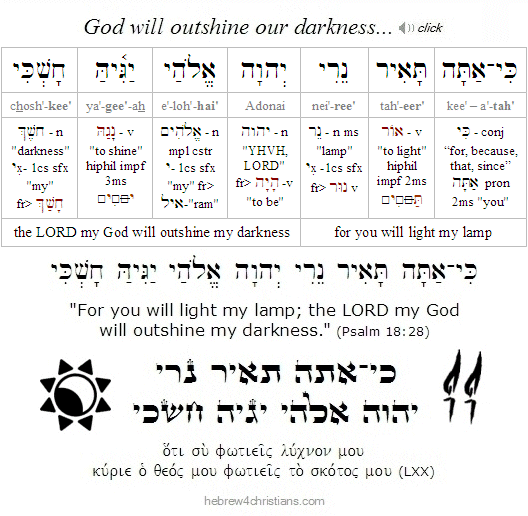 |
Finding Real Treasure...

11.12.21 (Kislev 8, 5782) For what do you hope? What are your dreams? Your deepest desires? Where is your treasure? Yeshua cautioned those who sought their happiness in this world: "Do not store up for yourselves treasures upon earth... be rich toward God" (Matt. 6:19-20; Luke 12:21). When we treasure God, our focus is directed toward the eternal reality, and our interest in this world is minimal. We trust God to meet our daily needs and surrender our future to His care. The only worry we face concerns our own deficiencies in our obligations to the Savior. Our duty is to love God in the truth - bekhol levavkha - with all our heart, having no thought of ourselves. Indeed, self-denial means to quit thinking about yourself (from α-, "not," + ῥέω, "to speak") by accepting what God has done for you. After all, "It is not my business to think about myself. My business is to think about God. It is for God to think about me" (Simone Weil). Amen. Simply looking toward God as your greatest good is to lose sight of your fears...
מי־לי בשׁמים
ועמך לא־חפצתי בארץ
mee-lee · va·shah·mah'·yeem
ve·ee·me·kha · loh-chah·fatz'·tee · vah·ah'·retz

"Whom have I in heaven but you?
And there is nothing on earth that I desire besides you."
(Psalm 73:25)

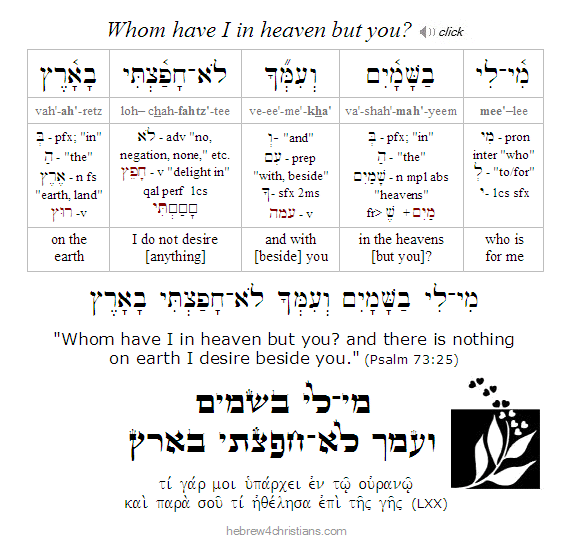
Leah's "Weak" Eyes....

11.12.21 (Kislev 8, 5782) Both Rachel and Leah are considered beautiful women in Jewish tradition, but a verse in this week's Torah seems to suggest that Rachel was the "beauty queen" of the family: "Leah's eyes were weak, but Rachel was shapely and beautiful" (Gen. 29:17). Why are Leah's eyes described as "weak"? Is this a euphemism for saying she was unsightly? After all, Rachel is described in this verse as yifat mareh - "beautiful of sight" (i.e., attractive). Does this text therefore contrast the two women by implying that Leah was physically unattractive? Or does having "weak eyes" mean that she was perhaps nearsighted? How are we to understand Leah's weak eyes?
The word translated as "weak" is the Hebrew word rakkot (רַכּוֹת), the plural form of the word rak (רַךְ), meaning soft or tender. Rashi comments that Leah's eyes were made "weak" (tender) from crying "until her eyelashes fell out." But why was she so sad? According to midrash, Leah's eyes were reddened and puffy because she was constantly lamenting the prospect of marrying Esau. The adage of the town was: "Two sons to Rivkah; two daughters to Lavan; the older to the older, the younger to the younger." Another, and perhaps more likely reason for Leah's tears, however, was that her father Laban was an evil man...
Leah's eyes were tender and tearstained, then, but this is not intended to say she was physically unattractive. On the contrary, saying that she had "weak eyes" is a term of praise for her, since (according to the midrash) her greatest fear was to be forced to undergo an arranged marriage with Esau, and therefore she wept and wept to be the mother of the righteous.... God saw her tears -- and blessed her to become the most fruitful of the four matriarchs of Israel. Ironically, it was the less teary-eyed Rachel, who later died in childbirth, that was prophesied to weep for her children (Jer. 31:15).
Regarding this subject the Talmud states that the word rak (tender) connotes royalty (Bava Basra 4a). Indeed, two lines of Jewish royalty were destined to descend from Leah: the royal family of Judah (from whom would come King David and King Messiah himself) and the spiritual line of Levi, from whom would descend Moses, Aaron, and the Kohanim (the priestly class of Israel). Like their tenderhearted mother, both of these houses of Israel would shed tears of concern for the well-being of Israel.
Hebrew Lesson
Proverbs 30:31 reading (click):
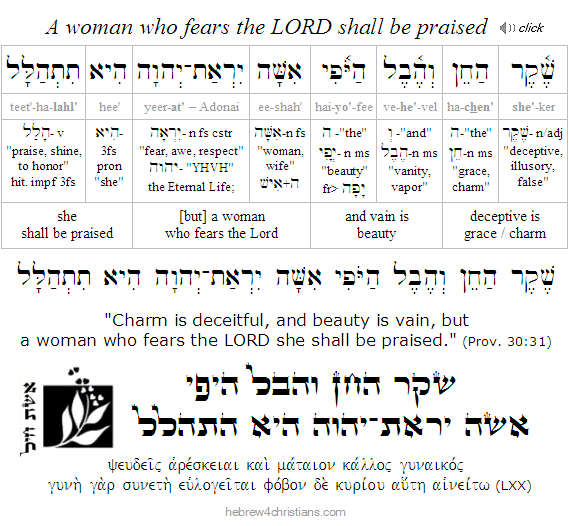 |
Jacob's Vision of Messiah...
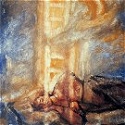
[ The following is related to this week's Torah reading, Parashat Vayetzei... ]
11.12.21 (Kislev 8, 5782) The revelation at Sinai and Jacob's vision of the ladder share something in common. Just as Yeshua was the "Voice of the Living God (קוֹל אֱלהִים חַיִּים) speaking (davar) from the midst of the fire" at Sinai (Deut. 5:26), so He was the Ascended LORD standing above the ladder speaking the word of promise (Gen. 28:12-15). In this connection we note that the words for "ladder," (i.e., sullam: סֻלָּם), "voice" (i.e., kol: קל), and "Sinai" (סִינָי) have the same numerical value, which suggests a connection between the great visions. Yeshua is the Ladder to God, the means by which the Living Torah both descends and ascends for the sake of our deliverance (John 1:51). The "ladder of Sinai" is not meant for us to ascend but rather is for the LORD our Savior to descend and ascend on our behalf. This is always the way of the Righteousness of God rather than the religious aspiratoins of man... Yeshua is the way, the truth, and the life (הדֶּרֶךְ וְהָאֱמֶת וְהַחַיִּים): no one can draw near to the Heavenly Father apart from Him (John 14:6).
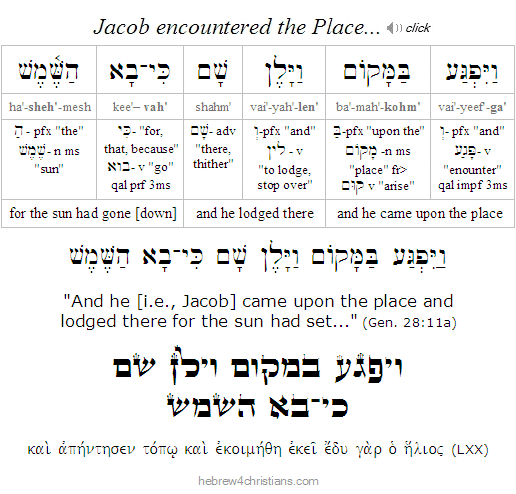 |
Note: For more on this subject, see "Jacob's Dream of Messiah."
Surrender to Peace...

11.12.21 (Kislev 8, 5782) "Be still and know that I am God..." (Psalm 46:10). This is something you must do; you must quiet your heart to know the Divine Presence. Therefore "set the Lord always before you" (Psalm 16:8) and refuse anxious thoughts that weigh in upon you, creating pressure and "dis-ease." Quieting your heart allows you to hear the holy whisper: "It is I; do not be afraid..." Once the storm of fear dissipates, you can access the truth of God. As the Spirit says, "In returning and rest you shall be saved; in quietness and in trust shall be your strength" (Isa. 30:15).
Worry is a place of exile and pain. Since God's Name (יהוה) means "Presence" and "Love," being anxious is to practice the absence of God's presence instead of practicing his presence... A divided house cannot stand. Where it is written, "cast all your anxiety on him because he cares for you" (1 Pet. 5:7), the word translated "anxiety" comes from a verb that means to divide into pieces. Bring your brokenness to God – including those distractions that make you ambivalent and afraid – to receive God's healing for your divided heart.
"Be still..." Note that the verb translated "be still" (i.e., rapha: רפה) means to "let go," to stop striving, and to surrender everything to the care of God (Rom. 8:28). "Being still" means letting go of your "need" to control the world. Relax your hold and rely on God's care for your life instead, without "taking thought" for tomorrow and its concerns (Matt. 6:34). The past is gone, after all, and the future is God's business: all you have is the present moment to call upon our Lord. Be faithful in the present hour, then, asking God for the grace and strength you need to endure yourself and engage the task at hand. In this way you will experience the peace of God "which surpasses all understanding" (Phil. 4:7).
Walking with God isn't just a matter of "head education," but also of "heart education," and these two must always go together as Spirit and Truth (John 4:23). Head education seeks knowledge primarily as a means of defining what you believe (emunah); heart education, on the other hand, centers on fear, or rather, on overcoming your fear by trusting in God's love and healing grace (bittachon). When you accept that you are accepted despite yourself, you are delivered from the need to defend yourself. You can let go, quit denying who you are, and accept God's unconditional care for your life – regardless of the state of the world. When your heart learns to "be still," you can know that the Lord your God reigns over all things!
"Be still and know that I am..." Prayer is a type of listening (shema), a turning back to know the message of God's love and hope in Messiah. The word "teshuvah" (תְּשׁוּבָה) means an answer or response to a question. God's love is the question, and the heart's response is the answer. Some of us may find it difficult to trust, to open our heart to receive grace and kindness. For those wounded by abandonment, it can be a great struggle to hear the voice of God calling you "beloved," "worthy," "valued," and "accepted." When you find faith to receive God's word of love, however, your heart comes alive and you begin to heal... Yeshua speaks words of comfort: "Blessed are those who have not seen and yet still believe."
Hebrew Lesson:
Psalm 46:10 reading (click):
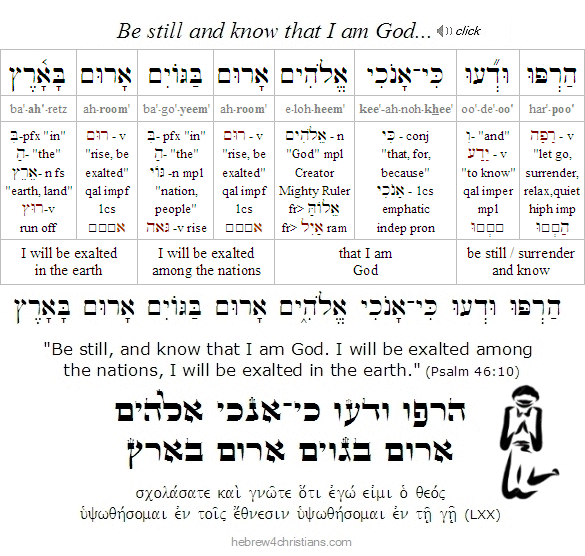 |
Trust in Dark Hours...

11.11.21 (Kislev 7, 5782) We are living in dark times, perilous days (2 Tim. 3:1-5; 2 Pet. 3:3). The world has become more and more lawless, corrupt, irrational, and violent. Many live in dread, sensing that days of difficulty are ahead. Indeed, with the advent of the "Covid" pandemic 18 months ago, it is evident that things are likely never to return to "normal" as the world economy and the global political situation are restructured... God has sent strong delusion "so that those who do not love the truth should believe a lie" (2 Thess. 2:10-11). These are truly unprecedented times, and the hour draws near, friends....
Though we might not understand why God allows these things to happen, we nevertheless hold fast to our conviction that the Lord is our Good Shepherd who is restoring our souls. He speaks to us in the midst of uncertainty: "Who among you fears the LORD and obeys the voice of his Servant? Let him who walks in darkness and has no light trust in the Name of the LORD and lean upon on his God" (Isa. 50:10).
מי בכם ירא יהוה שׁמע בקול עבדו
אשׁר הלך חשׁכים ואין נגה לו
יבטח בשׁם יהוה וישׁען באלהיו
mee · va·khem · ye·rei · Adonai · sho·mei'·a · be·kol · av·doh?
a·sher · ha·lakh · cha·she·kheem · ve·ein · no'·gah · loh?
yeev·tach · be·shem · Adonai · ve·yee·sha·ein · be·lo·hahv

"Who among you fears the LORD and obeys the voice of his Servant?
Let him who walks in darkness and has no light
trust in the Name of the LORD and lean upon on his God."

Hebrew Lesson:
Isaiah 50:10 reading (click):
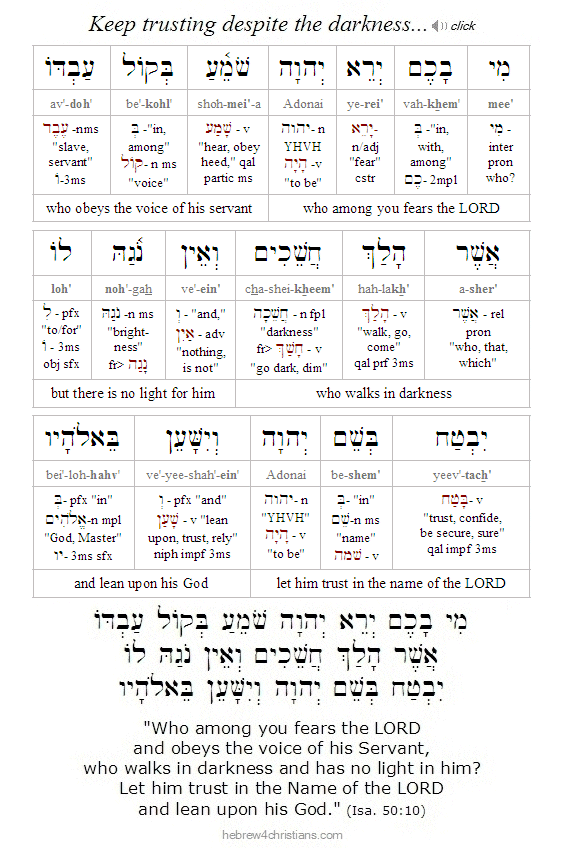 |
Friend, the Lord allows the dark cloud of unknowing for his own sovereign purposes, perhaps as a means to teach us to abandon ourselves to his care. Surely God understands our powerlessness; "he remembers our frame, that we are dust" (Psalm 103:14); surely He knows that we cannot see and therefore he calls us to "lean upon Him" for guidance. As we walk through the valley of the shadow of death we find that he is with us, and therefore we must choose to fear no evil.
Trusting in God (i.e., bittachon - בִּטָּחוֹן) does not mean that we are obligated to affirm that this is "the best of all possible worlds," though it does mean we believe that eventually God will wipe away every tear and make all things right. Bittachon is a word for this world, which says, "Though he slay me, I will trust in him..." We do not need to trust for what is seen in this world but for an unseen good (Rom. 8:24). Those who call upon the LORD can trust not only in concealed good behind ambiguous appearances ("all things work together for good") but also in a future, real, substantive good that will one day be clearly manifest for us all... We fight the "good fight" of faith, which is a worthy struggle that eventually is realized for blessing. We die daily; we mortify ourselves and surrender to God's will. Meanwhile, we ask the Lord to be kept from such depth of sorrow that leads to self-destruction and despair....
We must press on without fear, trusting that our faithful LORD will strengthen us for "such a time as this." We must be brave, equipped for battle, and full of conviction that the message of the gospel is the only hope for this moribund and decadent world. We must be on guard lest we fear, for fear is the greatest tool of the enemy of our souls, and therefore we must resist him steadfast and full of divine assurance. "The Lord is faithful: He will establish you and guard you against the evil one" (2 Thess. 3:3). The Spirit says, "Fear not, for I am with you always." The Lord "will sustain you to the end, guiltless in the Day of our Yeshua the Messiah" (1 Cor. 1:8). He who calls you is forever faithful; He will surely do it (1 Thess. 5:24).
"In me there is darkness, But with You there is light; I am lonely, but You do not leave me; I am feeble in heart, but with You there is help; I am restless, but with You there is peace. In me there is bitterness, but with You there is patience; I do not understand Your ways, But You know the way for me." "Lord Jesus Christ, You were poor And in distress, a captive and forsaken as I am. You know all man's troubles; You abide with me When all men fail me; You remember and seek me; It is Your will that I should know You And turn to You. Lord, I hear Your call and follow; Help me." - Dietrich Bonheoffer
If you ask for bread, your heavenly Father will not give you a stone... Only God can deliver us from our "disordered loves" to take hold of what is truly essential. All we can do is ask, and keep on asking - even as we struggle on, despite ourselves, despite our losses... And we often revisit our sins over and over until we become "sick of our sickness," that is, until we begin to understand what our heart really needs. It's as if we are constantly being asked, "Is this what you want?" and our choices confess the truth... Only God does the miracle of real change within the human heart - only God can give life from the dead!
Seeing with Wonder...

11.11.21 (Kislev 7, 5782) The commandment not to take the Name of the LORD "in vain" (Exod. 20:7) implies that we must affirm the sanctity, meaning, significance, and worth of life itself. We must never live as though God does not exist, or, to state this positively, we must "set the LORD" always before us (Psalm 16:8). It is therefore forbidden to ignore the miracle of existence, to scoff at the value of life, or to debase ourselves by refusing to receive the truth. We are to take every thought "captive" to the reality of the Messiah (2 Cor. 10:5). Everything belongs to God, and every moment we have is beholden to Him...
Finding deliverance from profane thinking requires concentrated focus, or "kavanah" (כַּוָנָּה). As it is written: "We destroy arguments and every lofty opinion raised against the knowledge of God, and take every thought captive to obey Messiah" (2 Cor. 5:10). We are instructed to "bring down reasonings" (λογισμοὺς καθαιροῦντες) and every high thing that is lifted up against the knowledge of God (κατὰ τῆς γνώσεως τοῦ θεου) and to bring every thought "as a captive" to the obedience (ὑπακοὴν, from ὑπό: by, under, + ἀκούω: hear, obey) of Messiah. We can do this negatively by fighting against evil thoughts and censoring the inner evil of our hearts, or we can do this positively by being "captivated" by the words and love of Yeshua, and often we have to do both! This is the deeper meaning of "profanity" - to deny reality, to live in willful ignorance, and to miss the wonder of God's presence. If we sanctify God in our hearts, we will be far less likely to use God's name in vain, of course.
God invites you to come to Him for relationship... Since God is a Person, He wants to know you as a person. He is not interested in formulaic prayers, religious rituals, or your membership at a particular religious organization. God wants to know your inmost thoughts and heart. Drawing near to God is God's way of drawing near to you... In other words, as you draw near to God, He will draw near and touch you.
Hebrew Lesson:
Exodus 20:7a reading (click):
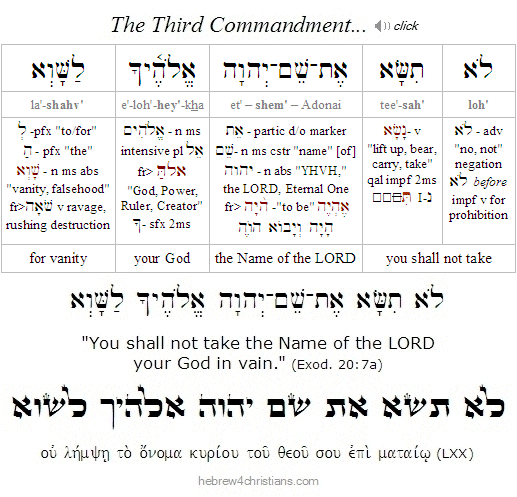 |
- Third Commandment podcast (mp3)
- Exod. 20:7a Hebrew page (pdf)
"Why are there beings at all instead of nothing"- this is obviously the first of all questions. Of course it is not the first question in the chronological sense [...] And yet, we are each touched once, maybe even every now and then, by the concealed power of this question, without properly grasping what is happening to us. In great despair, for example, when all weight tends to dwindle away from things and the sense of things grows dark, the question looms." - Martin Heidegger
"Not how the world is, but that it is, is the mystery." - Ludwig Wittgenstein
The Sacred Center...

11.11.21 (Kislev 7, 5782) "We are in God and God whom we do not see is in us" (Julian of Norwich). This follows from the meaning of the Name of God itself which is Eternal Life. YHVH (יהוה) means that God was (i.e., hayah: היה), God is (i.e., hoveh: הוֶה), and God always will be (i.e., yihyeh: יהיה) the Source, the Heart, and the End of our lives. "For from him and through him and to him are all things. To him be glory forever. Amen" (Rom. 11:36). We may think of the LORD as being "out there" someplace apart from us, but that is untrue, for he constantly upholds all things by the word of his power (Heb. 1:3) and by Him all things "consist" or "hold together" (Col. 1:17). His will is the gravity that directs all of reality. We may sometimes feel like God is distant from us, but understand that feeling to be an invitation to wake up, come alive, and to live before his Presence. Blessed are those who hunger and thirst for Him....
Hebrew Lesson:
Isaiah 6:3b reading (click):
God's Name means "I-AM-with-you-always," imanu-El (עִמָּנוּ אֵל) - always in the midst of you, in your heart, at the center of who you really are (Matt. 28:20; Isa. 41:10, Psalm 23:4, etc). The LORD is so named because he is never without his own, and we are who we are in relation to his presence in our lives. Yeshua is not simply the Lord of the past or the Lord of the future, but the Lord of this moment, this "here" and this "now." He is the same yesterday, today, and forever - the breath of life, our sustaining hope, the Shepherd of our souls... Whatever else may come of this day, this is the day that the LORD has made, and we find peace in God's Presence... Let us look to Him in this hour! Amen.
An Everlasting Love...

[ The following is related to this week's Torah reading, parashat Vayetzei... ]
11.11.21 (Kislev 7, 5782) Recall that when Isaac "was old and his eyes were dimmed from seeing," he thought to bless his son Esau as the family heir before he died (Gen. 27:1-4). When Rebekah learned of his intention, however, she decided to take matters into her own hands by tricking her husband into conferring the blessing upon his son Jacob instead of Esau. Rebekah must have felt justified in her actions; indeed, had not the LORD himself proclaimed that "the elder would serve the younger" before the twins were born (Gen. 25:23)? Regarding his role in Rebekah's scheme, Jacob was left with a terrible dilemma: Either he had to defy his mother or to deceive his father. To complicate matters, Rebekah realized that Isaac would discover the charade after the fact, though she may have reasoned that her ruse exposed his gullibility regarding the choice of Esau to be the chosen heir. It was not a real deception, then, but an object lesson for Isaac to wake up before it was too late! Rebekah's plan was to "open the eyes" of her blind husband, revealing to him that he had been guilty of sacrificing the righteous son Jacob for the sake of deceptive Esau.
The duplicity proved to be tragic, however, for everyone involved. Jacob desperately wanted the blessing of his father, but he agreed to get it through false pretenses. "Come close and kiss me my son..." (Gen. 27:26). This was Jacob's deep desire, and yet after "grappling" the blessing from his father he ironically lost his father's embrace. Indeed, Jacob lost not only his father's embrace, but his mother's as well (after fleeing to Haran, Jacob never saw his mother again). Moreover, Jacob's pathetic attempt to "be Esau" severed any hope of a relationship with his twin brother, who afterwards became his sworn enemy...
So it all went down. Isaac conferred the blessing to Jacob, and Esau was understandably enrages over his brother's (and his mother's) rejection of him as the chosen heir of the godly family and steward of the divine promise given to Abraham. When she overheard Esau's plan to exact revenge for his betrayal, however, Rebekah sought to send Jacob to her brother Laban who lived in the city of Haran, some 500 miles northeast of Canaan. To his credit, Isaac finally listened to his wife and reaffirmed the blessing over Jacob (Gen. 28:1-5). And Rebekah's faith in the prophecy was finally vindicated. Nevertheless, as Jacob ran away from his family home in Beersheva, he was confused and uncertain, though God mercifully intervened by giving him the vision of the Ladder and then ratifying the covenant blessing of Abraham and Isaac with him at Bethel (Gen. 28:11-22).
Jacob then continued his journey to Haran. When he finally arrived there, he went to the gathering place of the city well to learn where his uncle Laban (i.e., the grandson of Abraham's brother Nahor) lived and to inquire of his welfare. When the shepherds there told him that Laban was well, they then pointed to a young woman and said "and here comes his daughter Rachel with the sheep" (Gen. 29:6). Jacob then rolled away the stone from the mouth of the well and began watering Rachel's flock. He then excitedly informed her that he was her close relative, her aunt Rebekah's son, who had come from the land of Canaan.
So prophetically and providentially, when Jacob first arrived in Haran he beheld beautiful Rachel who welcomed him in his distress and embodied his hope. It was love at first sight for him. Rachel represented the promise of his blessing to become the patriarch of a multitude of people, and that through his offspring all the families of the earth would be blessed (Gen. 28:14). Because of this, Jacob made haste and soon bartered with his uncle Laban to work seven years to gain the right to marry his daughter. "So Jacob served seven years for Rachel, but they seemed to him but a few days because of the love he had for her" (Gen. 29:20).
The sages marvel over the perseverance that enabled Jacob to wait seven full years before marrying Rachel, and they ascribe his fortitude to divine grace that made "space shrink and time fly" (Sanhedrin 95b). By this they meant that Jacob's great love overcame the distance of time and space, that is, the sense of the exterior world, something which Jewish philosopher Martin Buber called the world of "It." The world of "It" is objective, outside of you, existing in its own independent modality. The world of "Thou," on the other hand, is that of personal relationship and inwardness, a realm distinct from the world of "It" with its objective categories and relationships. In other words, Jacob's great love made time "stand still" and drew Rachel close to him, despite the passing of years and the distance that separated them. The "math" of this passion made seven years - over 2,500 sunrises and sunsets - seem "as a few days," since the relationship they shared did away with physical and temporal barriers that separated them. Likewise we can endure the "It" of this world and regard it as quickly passing, "as a few days," when we are in loving "I-Thou" relationship with the Lord and with one another. We lose sight of worry, stress, and isolation, and rise above our present circumstances in our communion and in our hope. "For a thousand years in your sight are but as yesterday when it is past, or as a watch in the night" (Psalm 90:4).
When we feel afraid or lonely, the world looms large, distant, and cold. We feel trapped in its contours and alienated from our own hearts. On the other hand, when we befriend others and engage in honest conversation with them - when "two or three are gathered in my name" - the miracle occurs and the Lord is present in our midst - timelessly alive, full of welcoming grace, kindness, and love (Matt. 18:20). Moreover, since the Lord is always with us, whenever we sincerely turn to Him we are drawn into his love. As we open our hearts to him, as we engage him in trust, we lose sight of the outer world that confines and defines us, and we find our place in his love and in his blessing.
Hebrew Lesson:
Jeremiah 31:3b reading (click):
Note: Some of you may feel uneasy over the duplicity of Rebekah and the rejection of Esau as Abraham's heir, but it must be remembered that Esau was not a true believer, as evidenced by his repudiation of the birthright, and indeed he was indifferent regarding matters of the promises given to Abraham and Isaac... Jacob, on the other hand, was the legal heir and because of his faith the blessing and legacy belonged to him. To allow Esau to interfere with the lineage of the family line (he married Canaanite women, after all) would threaten the coming of the Messiah Himself - and this was not a matter to be taken lightly.
Helmet of Salvation...

11.10.21 (Kislev 6, 5782) "O GOD the Lord, the strength of my salvation, you have covered my head in the day of battle" (Psalm 140:7). We are in the midst of a great war for the sanctity of our souls, and the enemy is always fear. Fear amplifies our anxieties and magnifies our problems, since it heeds messages of unbelief and justifies despair. We must understand that fear is a false witness - an emissary that gainsays the truth and denies the power of God. In your struggle with fearful thoughts, take every thought captive and resolutely put your trust in the Lord. He will "cover your head" in the midst of the battle.
Hebrew Lesson:
Psalm 140:7 reading (click):
To Love the Truth...
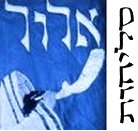
11.10.21 (Kislev 6, 5782) Like most things that are important for our spiritual lives, this bears repeating: Those who follow Yeshua are responsible to love and walk in truth and to abhor and reject what is false (1 John 4:6). This implies that we have a moral and spiritual duty to think clearly and not to abuse our minds (Phil. 4:8; Rom. 12:2). The LORD our God will help us to do this, as Yeshua said: "I will ask the Father, and he will give you a Helper (παράκλητος, someone "called to one's side"), to be with you forever, even the Spirit of Truth (i.e., ruach ha'emet: רוּחַ הָאֱמֶת), whom the world cannot receive, because it neither sees him nor knows him" (John 14:16-17). The Spirit of Truth helps us "discern what is the will of God, what is good, acceptable, and perfect" (Rom. 12:2) and empowers us to take "every thought captive" to the reality of the Divine Presence (2 Cor. 10:4-5). Truth is connected to memory - both in our personal histories as well as the history of God's redemptive actions performed on our behalf. Truth is described as "a-letheia" (ἀλήθεια), literally meaning "not forgetfulness..." Hence we are constantly commanded to remember what God has done for us and to "diligently repeat" (ושׁננתם) the truth to our children (Deut. 6:4-9). Similarly, the Spirit of Truth brings to remembrance the words of Yeshua to our hearts (John 14:26).
Hebrew Lesson:
Proverbs 22:6 reading with comments:
So followers of Yeshua are commanded to love the truth and to think clearly about their faith. The ministry of reconciliation (τὴν διακονίαν τῆς καταλλαγῆς) is defined as "the word of truth, by the power of God, through weapons of righteousness" (2 Cor. 5:18, 6:7). Indeed, the word of truth (τὸν λόγον τῆς ἀληθείας) is a synonym for the "gospel of salvation" itself (Eph. 1:13; Col. 1:5; James 1:18). We are saved by Yeshua, who is the "way, the truth, and the life" (John 14:6). God commands all people to believe this truth (Acts 17:30-31; 1 Tim. 2:4). People perish because "they refuse to love the truth and so be saved" (2 Thess. 2:10-12). Therefore we see that the issue of truth is central to salvation itself....
Genuine teshuvah (repentance) implies that we will change our thinking in order to be transformed by God's truth. The follower of Messiah "cannot do anything against the truth, but only for the truth" (2 Cor. 13:8). During this season before the return of the Lord, may God help us all to think clearly and to turn our thoughts to Him. May He protect us from the vanity of a darkened mind and from all distractions that attempt to seduce us away from Him. May the LORD give us the purity of heart to know and do His will in the truth. Amen.
The Ladder to Heaven...

[ Our Torah reading this week (Vayetzei) includes the famous vision of Jacob wherein he saw the angels of God ascending and descending a ladder that reached from earth toward heaven... ]
11.09.21 (Kislev 5, 5782) Recall that after Jacob had received the (second) blessing from his father Isaac, he fled for his life to escape the wrath of his brother Esau. He then came upon a certain place (וַיִּפְגַּע בַּמָּקוֹם) and stayed there for the night because the sun had set. Jacob then "took one of the stones of the place, and put it under his head, and lay down in that place to sleep" (Gen. 28:11). And so began Jacob's journey from his homeland to attain the promise of God, and such is the way for us as well, as we first receive our Father's blessing but soon are consigned to desolate places to await things yet unseen. For the way of blessing comes not from the "fatness of the earth" but from the more rarefied "dew from heaven," which descends in mystery, after the sun has set (Gen. 27:28, cp. Gen. 27:39).
The faithful "descend in order to ascend," which means they first suffer and then they are glorified. This is the pattern of Yeshua, who emptied himself and suffered before he was raised up in everlasting glory. "Unless a seed of wheat falls into the earth and dies, it remains alone; but if it dies, it bears much fruit" (John 12:24; 1 Cor. 15:36). God humbles and tests those whom he loves so they may learn to trust in his promise - his word - and to demonstrate his faithfulness in the end (Deut. 8:3; Rom. 11:36).
Note, then, that after being driven from his homeland Jacob dreamed of the ladder with the angels ascending and descending as the LORD himself announced his blessing over his seed (Gen. 28:12-14). Yeshua, as we learn from the gospel (John 1:51) explained that the vision ultimately referred to him - about how the angels followed him during his ascent and descent as the ladder or "bridge" between God and man. The descent refers to Yeshua's incarnation wherein he entered the realm of this world, clothed in human flesh as the Promised Seed, the "Son of Man" who would restore the lost dominion of Adam; whereas the ascent refers to Yeshua's resurrection - the redemption and return of fallen humanity by means of ascension and glorification as LORD over all. Luther understands the angelic host descending and ascending to reveal how the angels love and follow after their Lord -- whose face they do always behold -- eager to witness His advent as our Savior and Redeemer (see Matt. 18:10; 1 Pet. 1:12; 1 Tim. 3:16). Yeshua is Emanuel (עמנו אל), the Heralded Seed through whom all the families of the earth be blessed (Luke 2:8-15).
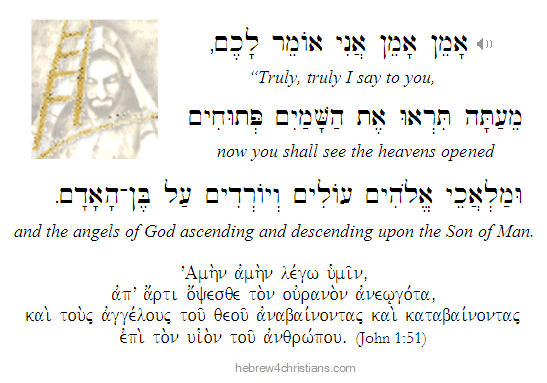 |
Returning to the account of the Torah, after Jacob received this dramatic vision, he awoke from his sleep and exclaimed: "Surely God is in this place, but I did not know!" And he was afraid, and said, "How dreadful is this place! this is none other but the house of God (בֵּית אֱלֹהִים), and this is the gate of heaven" (וְזֶה שַׁעַר הַשָּׁמָיִם, Gen. 28:16-17). Amen, Yeshua is ha'makom (המקום), the appointed "Place" of God, the very "House" of His presence; he alone is the way that leads us back to the Father (John 14:6). Yeshua is the Bridge to the Father, the narrow way of passage that leads to life. He has healed us from the sting of death. He calls out to us in the storm saying, "Take heart. It is I; be not afraid" (Matt. 14:27). Amen.
Hebrew Lesson:
John 14:6 reading (click):
Forget not His Love...

11.09.21 (Kislev 5, 5782) If something is worth truly saying, it is worth saying more than once... We learn by repetition. Consider how Yeshua retold his parables and messages throughout his ministry. God knows we are dull of heart and full of ourselves and therefore he says: וזכרת את־יהוה אלהיך- "Now remember the LORD your God!" and "Take heed to yourself, and keep your soul diligently, lest you forget the things that your eyes have seen, and lest they depart from your heart all the days of your life" (Deut. 4:9). Likewise the Shema teaches us to rehearse Torah "diligently" - again and again - so that our lives are suffused in its language and its significance (Deut. 6:4-9). When we sit in our house, when we walk by the way, when we lie down, and when we rise up -- in every place and at every time -- we are to remember the truth and thereby walk before the Living God.
"Take heed to yourself..." This warning underscores the danger we face of "forgetting" God, of losing sight of the truth of reality, and thereby lapsing into the realm of the profane... We must, therefore, foster within us a state of ongoing vigilance that regards the greatness of God in the midst of our daily lives. "Give us this day our daily bread." Your life, your being, and your very existence come from God, but forgetting this leads to "tohu va'vahu," a life of vanity and chaos. Therefore practice God's presence; believe to see the goodness of the LORD in the land of the living. The language God uses bespeaks his imperative passion for us: "Do not forget me! Keep your heart open to my Presence! Know me in all your ways..."
Hebrew Lesson:
Deut. 4:9a reading (click):
Draw near in your need...

11.09.21 (Kislev 5, 5782) "Draw near to God, and he will draw near to you" (James 4:8). There are no conditions given here -- other than your raw need to connect with God for help. "Purify your hearts, you double-minded ones" (δίψυχοι, lit. "two-souled ones"); make up your mind and be unified within your heart: "How long will you go limping between two different opinions?" (1 Kings 18:21). You are invited to come; God has made the way; your place at the table has been set and prepared. "Let us draw near with a sincere heart in full assurance of faith (ἐν πληροφορίᾳ πίστεως), with our hearts sprinkled clean from an evil conscience and our bodies washed with pure water. Let us hold fast the confession of our hope without wavering, for he who promised is faithful" (Heb. 10-22-23).
Hebrew Lesson:
Isaiah 55:6 reading (click):
Deliver us from Offence...

11.08.21 (Kislev 4, 5782) Yeshua forewarned that just before the End of Days, "many shall be offended, and shall betray one another, and shall hate one another" (Matt. 24:10). What dreadful people, you might imagine... what terrible depravity will mark that time! And yet here we are today, with so many crusading for their own personal sense of victimhood, demanding special treatment, and threatening retaliation for being treated unfairly... It must be remembered, however, that whenever we find offence in others, we are reflecting the evil within ourselves (Matt. 7:1-5). What is this evil within you ask? How about being intolerant toward those who differ from us? How about be impatient – refusing to allow others to share their perspectives? Indeed, how many of us make the demand that others be "perfect" but turn a blind eye to our own imperfections? And what about the sin of unforgiveness? What about our attitude of suspicion -- using the "evil eye" regarding others' motives – looking for something impure – rather than extending to them the benefit of the doubt? Do you carry resentment with your heart? Do you hold on to a grudge over a real (or imagined) insult from the past? Do you harbor the desire to seek revenge? All of these evil attitudes are symptomatic of hardhearted unforgiveness, and failing to remember that all that is good in your life you owe exclusively to the mercy of God alone... When you feel offended, look within and carefully consider the assumptions at work in your thinking. Ask whether your indignation is based on the truth of God or something else. Are you demanding: "My will be done, in heaven as it is on earth?" Are you seeking to fulfill your own vision, or surrendering to the truth of Reality?
It is written, "Whoever diligently seeks good seeks favor, but evil comes to him who searches for it" (Prov. 11:27). The one who seeks good is called shocher tov (שׁחֵר טוֹב), "a seeker of good." The shocher tov uses the "good eye" (ayin ha'tovah) to see worth and potential in others. The one who searches out evil, on the other hand, is called doresh ra'ah, "a searcher of evil." The doresh ra'ah has an evil eye (ayin ha'ra) that is "stingy," critical and faultfinding. The proverb may therefore be stated this way: When you seek the good of others, you will find God's favor (ratzon), but when you search for evil in others, it becomes your own. As the Baal Shem Tov once said, "When we see faults in others, we must understand that they only reflect the evil within ourselves." Likewise King David said, וּתְפִלָּתִי עַל־חֵיקִי תָשׁוּב, "my prayer shall turn back upon my breast" (Psalm 35:13). Some prayers are conscious words spoken to God, whereas others are expressions of heart attitudes. Our proverb teaches that when we harbor indifference, ill will, or resentment toward others, we hurt ourselves; when we favor others and desire their blessing, on the other hand, we will find God's favor and blessing. Tov ayin hu yevorakh: "The one with the good eye will be blessed" (Prov. 22:9; Matt. 6:22).
שׁחר טוב יבקשׁ רצון
ודרשׁ רעה תבואנו
shoh·cheir · tohv · ye·va·keish · rah·tzohn
ve·doh·reish · ra·ah · te·voh·e'·noo

"Whoever diligently seeks good seeks favor,
but evil comes to him who searches for it." (Prov. 11:27)

Hebrew Lesson:
Proverbs 11:27 reading (click):
Addendum:
Someone might object by saying that it is not right to overlook the evil we see in others, for example, the unjust practices of deceptive and immoral politicians, or the actions of criminals who commit acts of lawlessness. When we see evil, how do we see the good instead? Should we ignore wickedness and close our eyes to what is happening?
Well of course we should uphold law and the prosecution of criminals, and we should admonish (and sometimes even rebuke) our brothers and sisters when they sin, but in an ultimate sense, we have to see past the evil, to let it pass, in trust that God is sovereign and orders all things according to his sovereign purposes -- and that implies understanding that God suffers evil to exist in order to demonstrate his judgment, as it says: "The LORD has made all things for its purpose -- even the wicked for the day of evil" (Psalm 16:4).
Seeing the Unseen...

11.08.21 (Kislev 4, 5782) Yeshua told us: "Blessed are those who have not seen and yet have believed" (John 20:29). Despite the struggle of this life - our sorrows, pains, and even death itself - we believe in God's love and promise for us, even if we do not presently see the fulfillment of our hope, just as Abraham believed the promise that he would be the father of an innumerable multitude long before he saw any sign of its fulfillment. Abraham "believed the impossible" and "hoped against hope" (παρ᾽ ἐλπίδα ἐπ᾽ ἐλπίδι), meaning that hope moved within him even though there was nothing to see in the realm of the natural -- he believed in an unseen good; he trusted in the One who gives life to the dead and who "calls into existence the things that do not exist" (Rom. 4:17). The Scripture comments: "He did not weaken in faith when he considered his own body, which was as good as dead (since he was about a hundred years old), or when he considered the deadness of Sarah's womb. He did not stumble over the promise of God through unbelief but was strong in faith, and gave glory to God, fully persuaded that God was able to do what he had promised, and that is why his faith was counted to him as righteousness" (Rom. 4:19-22).
Likewise we are called to believe in an unseen good, an unimaginably wonderful destiny for our lives, as it says, "Things no eye has seen, nor ear heard, nor mind imagined, are the things God has prepared for those who love him" (1 Cor. 2:9). Faith does not use natural reason or the evidence of the senses to see the unseen, but it "believes to see" through "eyes of the heart" to know the hope of God's calling and to attain the blessing (Eph. 1:18). Faith in God's love comes from a different source and has a different means of apprehension than human wisdom, so that no matter how things might appear in this fallen world, the LORD God may be known and trusted to work all things for our ultimate good. "Blessed are those who have not seen and yet have believed." Amen.
Hebrew Lesson:
Psalm 27:14 reading (click):
Parashat Vayetzei - וַיֵּצֵא
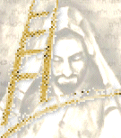
11.07.21 (Kislev 3, 5782) Our Torah for this week (i.e., parashat Vayetzei) includes Jacob's dream of a ladder (i.e., sullam: סֻלָּם) extending from earth to heaven, with the angels of God ascending and descending, and the LORD Himself standing above assuring Jacob of his safe return to the land he had fled. Jacob awoke and responded to the dream with awe: "Surely the LORD is in this place (בַּמָּקוֹם הַזֶּה), and I did not know it." And he was afraid and said, "How awesome is this place! This is none other than the house of God, and this is the gate of heaven." And he called the name of that place Bethel (בֵּית־אֵל) i.e., "the house of God."
The sages interpret ha-makom (הַמָּקוֹם), literally "the place" that Jacob saw, as Mount Moriah, the exact location where Jacob's father Isaac was bound as the "sacrificed seed" and which later became the site of the Holy Temple. Indeed the word makom comes from a verb (קוּם) meaning "to arise," suggesting resurrection and ascension. In later Rabbinical thought Ha-Makom became synonymous with the Name or Presence of God Himself ("God is the place of the world, but the world is not God's only place").
Yeshua referred to Jacob's dream when he said, "Truly, truly, I say to you, you will see heaven opened, and the angels of God ascending and descending on the Son of Man" (John 1:51). Just as Jacob saw the ladder ascending to heaven with the angels of God ascending and descending upon it, so Yeshua told Nathanael that He was the Ladder to God, the sha'ar ha-shamayim (שַׁעַר הַשָּׁמָיִם) - the way into heaven (John 14:6). Indeed, Yeshua is the true Place or "house of God" and its Chief Cornerstone (Rosh Pinnah, Matt. 21:42). The LORD is the resurrection and life, the One who prepares a place for you (John 11:25; 14:2).
Important Site Update....

11.07.21 (Kislev 3, 5782) The "H4C training site" has been hacked and is now offline; moreover, the online forum has also been hacked and disabled.... I am sorry for any inconvenience. I Thankfully, this site has not been affected by the attacks. I humbly ask for your prayers for the ministry to continue. Thank you.
Update: I upgraded the site with new security monitoring and now all is well...
Resisting Ungodly Fears...

11.05.21 (Kislev 1, 5782) The emotion of fear profoundly affects the way the brain processes images and messages. Fear colors the way we see and hear things. And since the mind and body are intricately interconnected, fear is the root cause of many physiological problems such as heart disease, high blood pressure, clinical depression, and other ailments. Indeed, left unchecked, fear can be deadly...
Most of our negative emotions come from fearful thoughts, including anger, frustration, and rage. On a spiritual level, fear and worry can cause people to question God's love, to doubt His promises, and so on. The devil knows that frightening people causes them to be unsettled, off-balance, and therefore vulnerable to all sorts of sickness, deception and manipulation. Living in fear is a form of slavery (Heb. 2:15).
God repeatedly tells us not to be afraid – not of man, nor of war, nor of tribulation, nor of various plagues, yea, nor even of death itself (Rom. 8:35-39). Indeed, one of the most frequently occurring commandments in Scripture is simply al-tirah (אל־תירא), "Be not afraid" (Isa. 41:10). That's because, in light of what is ultimately real, fearing anything other than the LORD God Almighty, the Creator, Judge, and King over all is an expression of unbelief. The fearful are referred to as the "unbelieving" and those who "love and make a lie" (Rev. 21:8, 22:15). We are forbidden to fear anything other than God (and by extension, our own faithlessness and sin). If we have no fear of God, then that truly is a fearful condition of soul.
We overcome ungodly fear by wholeheartedly trusting that the LORD for salvation. "I honor those that honor me," says the LORD, yet "how can you believe, when you receive glory from one another and do not seek the glory that comes from the only God?" (John 5:44). So what do you fear? Worldly loss? Sickness? Death? Yeshua gives us his answer: "I tell you, my friends, do not fear those who kill the body, and after that have nothing more that they can do. But I will warn you whom you should fear: Fear the one who, after the killing, has authority to throw you into hell. Yes, I tell you, fear him!" (Luke 12:4-5). If you are fearing man and his evil schemes, mandates, etc. turn to the Lord and confess your faithlessness. God saves us from our fears (Psalm 34:4, 2 Tim. 1:7). When we trust that God personally cares for us, we find strength and the resolve to face life without ungodly fear.
"Listen to me, you who know righteousness, the people in whose heart is my Torah; fear not the reproach of mortal man (אל־תיראו חרפת אנושׁ), nor be dismayed at their revilings. For the moth will eat them up like a garment, and the worm will eat them like wool; but my righteousness will be forever, and my salvation to all generations" (Isa. 51:7-8). Amen.
Hebrew Lesson:
Psalm 34:4 reading (click):
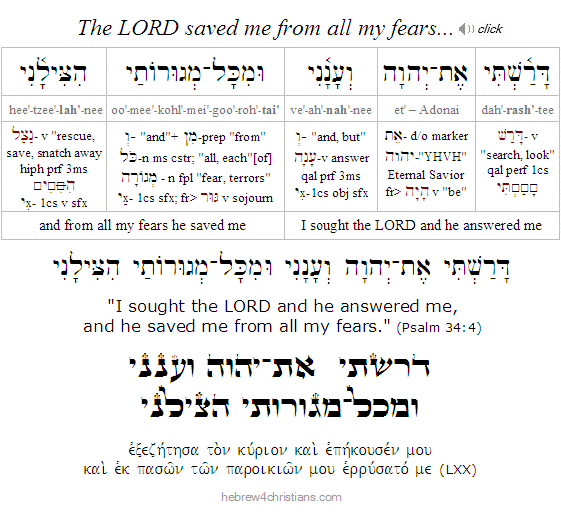 |
Comfort from the Shepherd...

11.05.21 (Kislev 1, 5782) The Spirit of the Lord comforts and reassures those who trust in Him: "My sheep hear my voice, and I know them, and they follow me. And I give them eternal life (חַיֵּי עוֹלָם), and they will never perish - no, never! - and no one will snatch them out of my hand" (John 10:27-28). Note that the Greek grammar in this verse uses a "double negation," which is the strongest way to deny something. In other words, if the question were asked, "Will one of these sheep perish?" the answer is emphatic: "No, no, it will never happen! It is unthinkable!" Indeed all those who belong to Messiah "shall never, ever perish - not into eternity (εἰς τὸν αἰῶνα)." It is an eternal certainty that you who are trusting in Yeshua will never perish, and no power in heaven or earth will be able to take you out of God's hand... "Surely goodness and mercy shall pursue you all the days of your life, and you shall dwell in the Presence of the Lord forever (Psalm 23:6).
Regarding the certainty of salvation Yeshua said: "I tell you the solemn truth, the one who hears my message and believes in the One who sent me has (i.e., ἔχει, present active indicative) eternal life and will not be condemned, but has passed over (i.e., μετά + βαίνω, lit., "crossed over" [עָבַר]) from death to life" (John 5:24). Note that the verb translated "has passed over" (μεταβέβηκεν) is a perfect active that expresses completed action: "this one has already passed over from death to life." In other words, it is an accomplished spiritual reality though it is only experienced as we surrender to the love and grace of God. As the apostle Paul later summarized: "For it is by grace you have been saved (i.e., σεσῳσμένοι, a perfect passive participle that denotes completed action done on your behalf with effects that continue to the present) through faith, and this not from yourselves, it is the gift of God, not a result of works, so that no one may boast" (Eph. 2:9-10). Ultimately, salvation is a question about who you really are, not about what you do....
God does not want us uncertain or unsure of His great love for us. A fearful believer explained that he was anxious about his acceptance before heaven. When he was asked to define "salvation," he answered, "freedom, deliverance, rest, peace." So you think fear will help you do away with your fear? You are fearful of the idea of freedom from fear? "Face the facts of being what you are, for that is what changes what you are" (Kierkegaard).
"Be strong and of good courage" - chazak ve'ematz (חֲזַק וֶאֱמָץ). The LORD God promises "never to leave you nor forsake you," and to be with you wherever you go (Josh. 1:5,9; Heb. 13:15, Psalm 139; Matt. 28:20). In the Greek New Testament the wording of Hebrews 13:15 is highly emphatic: "Not ever will I give up on you (οὐ μή σε ἀνῶ); no, not ever will I leave you behind (οὐδ᾽ οὐ μή σε ἐγκαταλίπω)." May you hear the voice of the Good Shepherd calling you, and may He forever keep you under His watchful care. Amen.
Hebrew Lesson:
Joshua 1:9 reading (click):
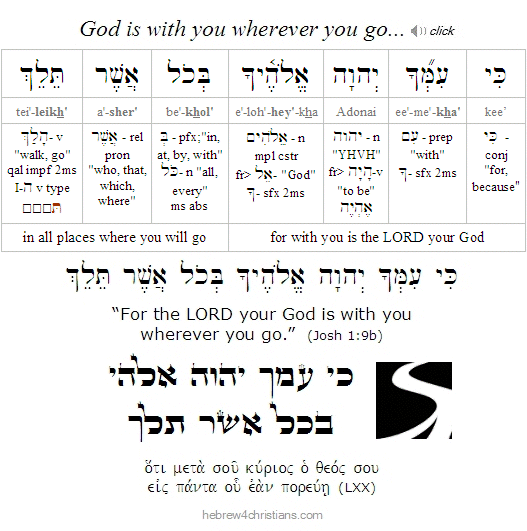 |
Finding Inner Peace...
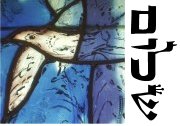
11.05.21 (Kislev 1, 5782) The ultimate question is whether you feel "safe" with the truth of who you really are... When you are all alone, in a moment of still silence, when the entire world is asleep and suspended, what is the message of your heart's cry? Are you okay? Do you trust who you are or what is happening to you, or do you experience anxiety, a sense of lostness, inner pain? Comfort is found in God's grace. His promise is given to the sick at heart, to those who understand their need for a physician (Matt. 9:12). Since there is nothing about you to commend before God, you are made free to abandon yourself to the divine love. This is the "Name of the LORD," after all, and your heart's cry for love is a "prayer" uttered in that Name. Your heavenly Father sees in secret (Matt. 6:6). Consider the birds of the air; they are unreflective, alive in the atmosphere of God's care. What a great blessing to let go of your fear; what sweet relief! Surrender to the truth of your helplessness; rejoice that you are "poor in spirit," and discover that yours is the Kingdom of Heaven (Matt. 5:3). So don't give up your faith, my friend. God promises to be with you to the end, leading you to the place where your heart will forever be satisfied in his love. Amen.
Hebrew Lesson:
Psalm 29:11 reading (click):
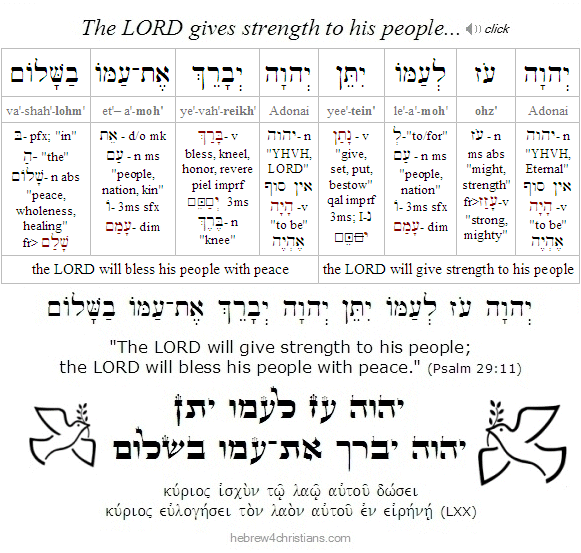 |
God's Sovereign Love...
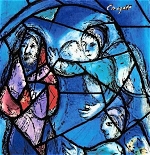
11.04.21 (Cheshvan 29, 5782) The Haftarah for parashat Toldot begins: "I have loved you," says the LORD. But you say, "How have you loved us?" "Is not Esau Jacob's brother?" declares the LORD. "Yet I have loved Jacob but Esau I have hated. I have laid waste his hill country and left his heritage to jackals of the desert" (Mal. 1:1-3; cp. Rom. 9:9-13). Some people may find God's sovereign choice objectionable, though we know there is no unrighteousness in God's decrees and ways (Deut. 32:4; Psalm 18:30; James 1:17, etc.). Indeed Yeshua likewise told his followers, "You did not choose me, but I chose you and appointed you to go forth and bear fruit..." (John 15:16).
Religious pride recoils at these words, thinking, "I don't want to be chosen by God; I want to be in control; I want to choose God first!" The ego seeks some reason for revelation, some merit that commends the self to God. It's hidden assumption is, "thank you, God, that I am not like other men" (Luke 18:11). The choice of God is therefore scandalous because it is based on God's love, not our own (1 John 4:19). We were spiritually reborn, not as the result of anything in the realm of nature, nor even through our personal decision, but solely on account of God's sovereign prerogative (John 1:13). This is the message of the choice of Jacob over Esau in our Torah portion this week.
Regarding this the New Testament comments: "Though they (i.e., Jacob and Esau) were not yet born and had done nothing either good or bad -- in order that God's purpose of election might stand (ἵνα ἡ κατ᾽ ἐκλογὴν πρόθεσις τοῦ θεοῦ μένῃ), not because of works but because of the One who calls, Rebekah was told, "the older will serve the younger" (Rom. 9:11-12). Again, the carnal ego looks for reasons that God might choose someone, looking for merit or considering their worldly potential, though it is idolatrous to elevate the self this way. "Not by might nor by power, but by my spirit, says the LORD of Hosts" (Zech. 4:6). We don't seek to please God so that we can be chosen; we are chosen so that we can seek to please him... God's grace and love for us is always the starting point: "Lord, teach us to pray," that is, choose words for us, the groaning of your Spirit, in accordance with your perfect will...
Hebrew Lesson:
Exodus 33:19b reading (click):
Over the years I have repeatedly affirmed the "salvation is of the LORD" (לַיהוָה הַיְשׁוּעָה), and therefore we are not saved "by works of righteousness (מַעֲשֵׂי הַצְּדָקָה) that we have done, but solely on account of the mercy given to us in God our Savior (אֱלהִים מוֹשִׁיעֵנוּ; Titus 3:4-5). Grace excludes all boasting (Eph. 2:9; Rom. 4:4). We believe that God justifies the ungodly (helpless) by trusting in his heart of compassion (Rom. 4:1-8). God loves you with "an everlasting love" (i.e., ahavat olam: אַהֲבַת עוֹלָם) and draws you in chesed (חֶסֶד, i.e., His faithful love and kindness). As it is written: "I love you with an everlasting love; therefore in chesed I draw you to me" (Jer. 31:3). Note that the word translated "I draw you" comes from the Hebrew word mashakh (מָשַׁךְ), meaning to "seize" or "drag away" (the ancient Greek translation used the verb helko (ἕλκω) to express the same idea). As Yeshua said, "No one is able to come to me unless he is "dragged away" (ἑλκύσῃ) by the Father (John 6:44). God's chesed seizes us, scandalizes us, takes us captive, and leads us to the Savior... Spiritual rebirth is a divine act, "not of blood nor of the will of the flesh nor of the will of man, but of God" (John 1:13). In everything - including human reason itself - the LORD God Almighty is preeminent. God loves all people - it is his nature to love - but not everyone responds to God's love, and therefore "many are called, but few chosen." Dear friend, if God has chosen you to be in covenant with him, then you are indeed one of the "chosen people."
Hebrew Lesson:
Jeremiah 31:3b reading (click):
Therefore may you affirm the great benediction given in our Scriptures: "Blessed be the God and Father of our Adonai, Yeshua the Messiah, who has blessed us in Messiah with every spiritual blessing in the heavenly places, even as he chose us in him before the foundation of the world (καθὼς ἐξελέξατο ἡμᾶς ἐν αὐτῷ πρὸ καταβολῆς κόσμου), that we should be holy and blameless before him. In love he predestined us (προορίσας ἡμᾶς) for adoption as sons through Yeshua the Messiah, according to the purpose of his will, to the praise of his glorious grace, with which he has blessed us in the Beloved; in whom we have redemption through his blood, the forgiveness of our trespasses, according to the riches of his grace, which he lavished upon us, in all wisdom and insight..." (Eph. 1:3-8).
It is the fruit of his Spirit, not the fruit of our own that matters (Gal. 5:22-23). As Yeshua said, "it is the Spirit who gives life; the flesh is no help at all" (John 6:63). We are God's workmanship, created in the Messiah for good works, which God prepared beforehand that we should walk in them" (Eph. 2:10). We are able to live for God through the agency of His love and sustaining grace, all for the sake of the glory of His Name. "For from Him and through Him and to Him are all things. To Him be glory forever. Amen" (Rom. 11:36).
Not of this World...
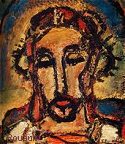
11.04.21 (Cheshvan 29, 5782) Life in this evil world can be suffocating at times. And while we may not be under the oppression of a cruel Pharaoh, we are neverthess afflicted by the "princes of this age" who spurn the message of the Messiah's redemption and love, and we are still subjected to bondage imposed by taskmasters who defy the LORD and who seek to enslave us by means of lies, propaganda, "mandates," and threats of violence... The devil is still at work in the hearts and minds of his "little Pharaohs" that serve the world system.
Nevertheless "there is no fear in love" (אין פַּחַד בָּאַהֲבָה), especially since we know that ein od milvado -- there is no real power apart from the LORD (i.e., He is the only true Power in the universe). Indeed, Yeshua is elyon lemalkhei-aretz (עֶלְיוֹן לְמַלְכֵי־אָרֶץ) - the "Ruler of the princes of the earth" (Rev. 1:5) - and that means that they will answer to Him (Psalm 2).
For such a time as this... Worldly power seeks to coerce and persecute people to bow before the idol of the State in defiance of the Living God. Resist them by prayer. Call out to the Lord for deliverance. αὕτη ἐστὶν ἡ νίκη ἡ νικήσασα τὸν κόσμον, ἡ πίστις ἡμῶν: "This is the victory that overcomes the world: our faith" (1 John 5:4). Chazak ve'ematz! מחיל אל־חיל - "from strength to strength!"
Hebrew Lesson:
Psalm 50:15 reading (click):
If you belong to the Messiah you are not part of this world and its matrix of deception but instead serve the King of Kings (Col. 1:13; Acts 26:18; 1 Pet. 2:9). Therefore set your thoughts on things above, not on things of this world (Col. 3:2). In the end all things born of the lie will be exposed and forever put away from us (Eccl. 12:14). The great Day draws near. "For though the vision awaits its appointed time; it hastens to the end -- it will not lie. If it seems slow, wait for it; it will surely come; it will not delay" (Hab. 2:3).
Hebrew Lesson:
Ecclesiastes 12:14 reading (click):
"Rabban Gamaliel the son of Rabbi Judah Hanasi used to say: 'Do His will as though it were your will, so that He will do your will as though it were His. Set aside your will in the face of His will, so that he may set aside the will of others for the sake of your will. Hillel said: 'Do not separate yourself from the community; Do not trust in yourself until the day of your death; Do not judge your fellow man until you have reached his place.'" (Avot 2:4).
The Reward of Faith...

11.04.21 (Cheshvan 29, 5782) It is written in our Scriptures: "Without faith it is impossible to please God, for whoever would draw near to God must believe that he exists and that he rewards those who seek him" (Heb. 11:6). Note that the word translated "impossible" in this verse (ἀδύνατος) means powerless, incapable, and so on, which implies that faith is the key that opens the door to God's presence. It is not possible to please God, after all, if you do not believe in his Reality and concern for your life. Indeed confidence in God's promises is the foundation of everything; it is the source of your inner life connection and the answer to your prayer for healing. As Yeshua said: "Take heart; your faith has made you whole" (Matt. 9:22).
God rewards those who earnestly seek him. This hearkens to the promise made to our father Abraham: אל־תִּירָא אַבְרָם - "Fear not, Abram," אָנכִי מָגֵן לָךְ – "I am your Shield," שְׂכָרְךָ הַרְבֵּה מְאד - your reward shall be very great" (Gen. 15:1). "For the LORD God is a sun and shield; the LORD bestows favor and honor. No good thing does he withhold from those who walk in trust" (Psalm 84:11). God imparts favor to those who honestly seek Him, as it is written: "and you shall seek me, and find me, when you shall search for me bekhol levavkha - with all your heart" (Jer. 29:13).
That is the teshuvah (answer) to God's haunting question regarding your life; you find "all your heart" as you seek God's presence in all your ways (Prov. 3:6). Faith is its own reward since it imparts the blessing of Reality. The Greek word used to translate "those who seek" is a present active participle (ἐκζητοῦσιν) that refers to those who continue to search for God's Presence and truth - even in the midst of the struggle of life. Like the prophet Enoch, this is the way to "walk with God." So do not lose heart or throw away your confidence, dear friend, because it has great reward (Heb. 10:35).
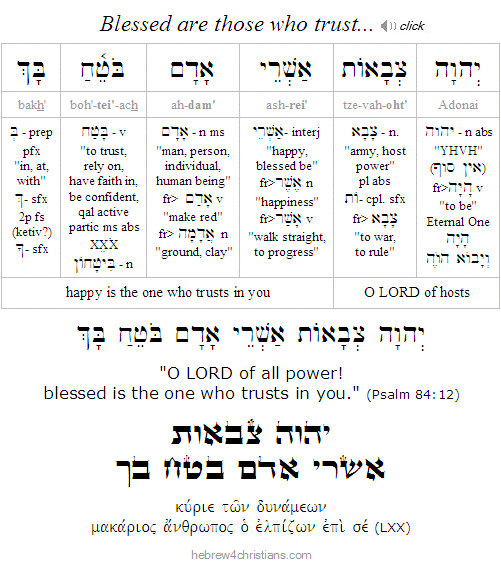 |
Two Blessings for Jacob...
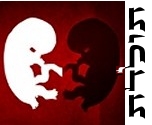
[ The following is related to this week's Torah reading, parashat Toldot... ]
11.03.21 (Cheshvan 28, 5782) When we think of Jacob as a young man, we tend to recall the dramatic episode when he surreptitiously disguised himself as Esau to "steal" the blessing from his father Isaac. In this week's Torah, however, we note that Jacob actually received two blessings from his father. The first blessing -- given to a disguised Jacob -- focused on material blessings: the "dew of heaven," the "fatness of the earth," "plenty of grain and wine," political power and hegemony (Gen. 27:28-29), whereas the second blessing -- given to an undisguised Jacob -- focused on his role as God's chosen patriarch of Israel (Gen. 28:3-4). The difference between these blessings turned on Isaac's restored vision. His first blessing was tailored to the character of Esau as his "natural choice," whereas his second blessing looked beyond mere appearances to behold the vision that was originally given to his father Abraham:
וְאֵל שַׁדַּי יְבָרֵךְ אתְךָ
וְיַפְרְךָ וְיַרְבֶּךָ וְהָיִיתָ לִקְהַל עַמִּים
וְיִתֶּן־לְךָ אֶת־בִּרְכַּת אַבְרָהָם
לְךָ וּלְזַרְעֲךָ אִתָּךְ
ve·el · Shad·dai · ye·vah·rekh · oht·kha
ve·yaf'·re·kha · ve·yar·be'·kha · ve·ha·yee'·ta · leek·hal · a·meem
ve·yee·ten · le·kha · et · beer·kaht · av·rah·hahm
le·kha · ool·zar·a·kha · ee·takh

"May El Shaddai bless you,
make you fruitful and multiply you so you become an assembly of peoples.
And may He grant the blessing of Abraham
to you and your offspring"
(Gen. 28:3-4)
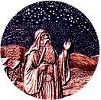
- Isaac's second blessing to Jacob
In a sense, the self-effacing, disciplined, and strong-willed Isaac abandoned his "natural vision" (i.e., to install Esau as the next patriarch, despite the objection from his wife Rebekah) by finally surrendering to the vision of his father Abraham. Isaac's entire life was a sort of overreaction to his father - an "antithesis to Abraham's thesis." By choosing to bless Jacob a second time, this time with his eyes wide open, Isaac revealed that he had finally accepted the grace of God that was revealed to his father Abraham.
Recall that after Esau discovered that the blessing was given to Jacob, he lamented and pleaded with his father to bestow upon him a blessing as well. It is interesting to note that the "residual" blessing that Isaac gave to Esau was the inverse of that given to Jacob: the "fatness of the earth" was put before the "dew of heaven" (compare Gen. 27:39 with Gen. 27:28). Receiving sustenance from heaven is of greater value than finding earthly prosperity. And indeed, Jacob was "blessed" with trouble his whole life, which caused him to rely on the "dew from heaven," whereas Esau was "blessed" with prosperity (and trouble) that came from trafficking in this world (Heb. 12:17).
Hebrew Lesson:
Genesis 28:3b reading (click):
Note: Isaac was 60 years old when his two sons were born (Gen. 25:24-26), and according to Jewish tradition, Jacob and Esau were 63 years old at the time of the blessings (Yevamot 6a), making Isaac 123 years old at the time. He died at the age of 180 (Gen. 35:28-29), making him the longest living of the three patriarchs. The Talmud further states that Jacob first fled to the School of Shem (i.e., Malki-Tzedek) before proceeding to Padan Aram, so that actually arrived at Laban's home when he was 77.
Seeing what we want to see...
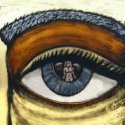
11.03.21 (Cheshvan 28, 5782) We often see what we want to see... From our Torah portion this week (i.e., Toldot) we read: "Now Jacob was simmering stew when Esau came in from the field, famished" (Gen. 25:29). The Midrash Rabbah comments that Esau saw the stew and asked why it was being cooked. He was told that it was a traditional mourner's meal because his grandfather Abraham had just died. Upon hearing this, Esau quickly became offended that one so righteous as Abraham had died and exclaimed: "If that's the case, there is no reward for one's good deeds, and no repair from death..." In this way Esau's offence over sorrow and suffering moved him to reject reality as being inherently unjust, and by this logic he justified his godless lifestyle... Because bitterness took root within his heart, Esau despised his birthright and spurned the very significance of his life (Heb. 12:15-16).
Jewish post-Holocaust theology (i.e., "theology after Auschwitz") has wrestled with these sorts of harrowing and disturbing questions, though on a far larger and more traumatic scale. How could an all-loving, all-knowing, and all-powerful God allow (or permit) the horrors of the Shoah? For many Jews, the Holocaust marked the practical end of their faith, while for others it marked the start of a "theology of protest." In either case, however, the horrific reality of the Holocaust requires an authentic response from all of us. Providing an intellectual theory about the "problem of evil" seems empty and even irreverent in the face of such unspeakable acts of cruelty. Beware of any theology that denies the reality and heartache of human suffering. Yeshua offered up "loud cries and tears" during the days of his flesh, and he wept over the pain others experienced (Heb. 5:7, John 11:35).
In Fyodor Dostoyevsky's novel The Brothers Karamazov (1880), Ivan Karamazov argued with his devout brother Alyosha regarding the nature of faith. Ivan intellectually accepted God's existence, His wisdom, and His heavenly goal to ultimately save an alienated world, but he nonetheless challenged the idea that any future good -- even if it should be "beyond all the heart's imaginings" (1 Cor. 2:9) -- could ever "atone for" the present evil and manifold suffering found in this world. To make his point, Ivan needed to find just one case of entirely "gratuitous evil" - an irrefutable counterexample to the viewpoint that this is the "best of all possible worlds." He therefore listed a number of cases of extreme and excessive cruelty in the world, but he finally focused on a heart-wrenching account of a five year old girl who was chained to an outhouse and left to die in the Russian winter. No matter what might be offered in the way of "defense" of God, no "future good" could possibly justify the suffering of this child. Despite the hopeful theory that God will one day "wipe away every tear," Ivan stated that he could never accept the nature of this-worldly reality: "I refuse to accept this world of God's... Please understand, it is not God that I do not accept, but the world he has created. I do not accept God's world and I refuse to accept it."
Such is the essence of the "offense" (σκάνδαλον) held within the faithless and fearful heart, an offense that objects over the decrees of God and therefore over reality itself. It is a protest, a generalized objection, to the "drama" of the universe decreed by God to be a place of suffering and pain that ultimately leads to redemption.... Spiritually speaking, this offence is the deep despair called the "sickness unto death." We are therefore warned by the Spirit of God: "See to it that no one fails to obtain the grace of God; that no root of bitterness (שׁרֶשׁ פּרֶה) springs up and causes trouble, and by it many become defiled; that no one is immoral or profane like Esau, who sold his birthright for a single meal. For you know that afterward, when he desired to inherit the blessing, he was rejected, for he found no chance to repent, though he sought it (the blessing) with tears" (Heb. 12:15-17; Gen. 27:38).
"The optimist believes that this is the best of all possible worlds; the pessimist believes the optimist is right..." The facts remain the same for both, but what is different is something within the heart, something that moves the will to no longer recoil from the world but rather to accept it. Faith is a type of courage, a willingness to take risks, even in the midst of ambiguity. It surrenders to God's plan and will, even if that plan makes no sense at the moment. Of course it is intellectually "safer" to refrain from such trust and to yield to a "hermeneutic of suspicion." It is woefully easy to play the skeptic, to toy with ultimate questions, to affect intellectual superiority -- but at what cost? Is the supposed "defense" against being mistaken more important the risk of commitment? Isn't such an approach to life essentially a form of cowardice? Without risk, we would never marry, have children, or take hold of our dreams. Some people might dismiss the dream of God's love as nonsense and futility, but the Scriptures make it clear that such hope represents the very substance (ὑπόστασις) of our faith (Heb 11:1).
Hebrew Lesson:
Psalm 18:26 reading (with comments):
Note: For more on this subject see "Musings about Suffering," and "The Power of Hope."
Our Father, Our King...
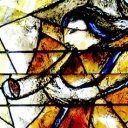
11.03.21 (Cheshvan 28, 5782) "Blessed are you, O LORD God of Israel our Father, forever and ever. Yours, O LORD, is the greatness and the power and the beauty and the victory and the majesty, for all that is in the heaven and in the earth is yours. Yours is the kingdom, O LORD, and you are exalted as head above all" (1 Chron. 29:10-11). Amen, amen. In light of this blessed truth, then, what is it but unbelief that incites us to fear, to become anxious, frustrated, angry, and to seek to control outcomes? Forgive us, O Lord: We sometimes fail to remember your greatness; we lose sight that you indeed reign over all; our fears moves us into exile, our hearts grieve when we find ourselves immersed in the vanity of this world... But your kingdom rules over all and therefore everything is under your ongoing supervision... You sustain and uphold all things by the Word of your Power (נוֹשֵׂא כל בִּדְבַר גְּבוּרָתוֹ); you are our good Shepherd, our loving Father; you watch over our ways; you write our names upon your hands; and you show us the path of life (Psalm 16:11). "You are strength and might, and it is in Your power to make anyone great and strong," and therefore help us, O Lord, to revere you; help us to know that nothing is trivial; awaken us to the truth of your Reality and Presence... Teach us to number our days that we might become wise (Psalm 90:12); we are as a breath; our days are like a passing shadow (Psalm 144:4); have mercy upon us and redeem the days appointed for our sojourn.
Hebrew Lesson:
1 Chron. 29:11 reading (click):
Ultimate Concerns...

11.02.21 (Cheshvan 27, 5782) Blaise Pascal wrote that faith in Yeshua is essentially a confession of irreparable human infirmity, and therefore its message is always directly there - to the place of our pain and desperation. Consequently it has no voice or message to mere triflers - to those who might patronize it as philosophically interesting, morally edifying, poetically beautiful, politically useful, and so on. No, no, never: the Spirit speaks to the heart in its anguish, in its lament over the suffering and agony of life in this world, and there breathes out the haunting question, "Do you want to be healed?"
עקב הלב מכל ואנשׁ הוא
מי ידענו
ah·kohv · ha·leiv · mee·kohl · ve·a·noosh · hoo
mee · ye·dah·ei'·noo

"The heart is deceitful above all things, and incurably sick;
who can understand it?"
(Jer. 17:9)

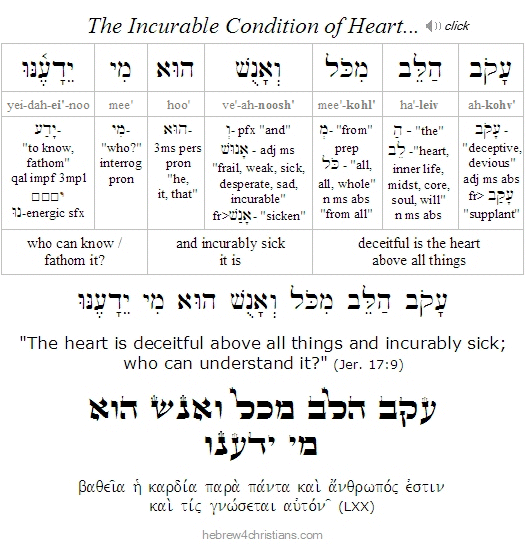
Though our faith can be expressed in "theological" terms, it remains first of all a message to the individual in existential distress, shouting the way of escape to those on the edge of the everlasting abyss... The language of genuine teshuvah is one of ultimate concern, a message that appeals to matters of life and death itself.
"A life of a human being begins with the illusion that a long, long time and a whole world lie before him in the distance, begins with the foolhardy delusion that he has such ample time for his many claims. The poet is the eloquent and enthusiastic confidant of this foolhardy but beautiful delusion. But when a person in the infinite transformation discovers the eternal itself so close to life that there is not the distance of one single claim, of one single evasion, of one single excuse, of one single moment of time from what he in this instant, in this second, in this holy moment shall do - then he is on the way..." (Kierkegaard: Works of Love)
Revelation of God...

11.02.21 (Cheshvan 27, 5782) Philip said to him, "Show us the Father and we will be satisfied." Yeshua replied, "Have I been with you so long, and you still do not know me, Philip? Whoever has seen me has seen the Father. How then can you ask, 'Show us the Father'? (John 14:8-9). Yeshua – and Yeshua alone – reveals the heart and truth of God to us, and looking for God "beyond" Him – up in heaven, across the sea, or in the mysteries of unfathomable forces that pervade reality – is ultimately a sign of unbelief and a denial of God Himself. The Father and the Son are of one essence and trying to separate them vitiates the message of Yeshua and makes it appear unfinished.... On the contrary, the work of salvation is finished, and "Whoever has the Son has the life (החיים); but whoever does not have the Son of God does not have the life" (1 John 5:12). There is no other way to access the heart of the Father than through Yeshua, and Yeshua is the Name above all other names for salvation (John 14:6; Acts 4:12; Phil. 2:9-11; John 17:3). Every knee shall bow to Him; there is no other Savior (Isa. 45:21-23).
Those who honor the Son honor the Father and understand the heart of reality To know God is to know the revelation given in the Son, for the Son is God clothed in human skin, reaching out in compassion to heal the trusting sinner from eternal alienation. Just as the Angel of the LORD is the "King of Angels," the manifestation of God in angelic form, so the Son of Man is the manifestation of the LORD in human form. There is no other Savior; there is no further place to ascend or to seek: Yeshua is the Beginning and End of the Truth of the Compassion of the Eternal God. Let us resolve, then, that with all our heart and with all that is within us, we shall express the truth of God's kingdom and the truth of His salvation. Amen.
Hebrew Lesson:
John 14:6 reading (click):
Refusing Doubt...

11.02.21 (Cheshvan 27, 5782) If you have read the gospels, you are surely familiar with a disciple of Yeshua named "Thomas Didymus," sometimes referred to as "Doubting Thomas." Recall that when Thomas had first heard the testimony of the other disciples that Yeshua was raised from the dead, he was apprehensive and vowed to suspend his judgment until he had sufficient evidence to believe the matter for himself: "Unless I see the wounds from the nails in his hands, and put my finger into the wounds from the nails, and put my hand into his side," he said, "I will never believe it!" (John 20:25). You know the rest of the story. When Yeshua later appeared to the disciples and this time Thomas was present, he said to him: "Put your finger here, and examine my hands. Extend your hand and put it into my side. Do not be become faithless, but believe" (John 20:27).
You might think this lesson should be obvious enough for us: "Don't doubt, but believe; don't harden your heart; don't withhold your hope; don't trust in human reason more than the testimony of faith; in other words, don't act like Thomas did! And yet today it has become fashionable to "celebrate doubt" and to "deconstruct" the testimony of our fathers. Instead of venerating the Scriptures that tell of the ordained plan of God to send Yeshua to die for our sins (Gen. 3:15; Isa. 53:1-12; John 3:16; Acts 3:18; 1 Pet. 1:20; Heb. 1:1-3, etc.), false teachers have arisen to "tickle the ears" of those who do not want to believe: "For the time is coming when people will not endure sound teaching, but having itching ears they will accumulate for themselves teachers to suit their own passions, and will turn away from listening to the truth and wander off into myths" (2 Tim. 4:3-4). This is that time, friends. Instead of abhorring doubt as the sin against faith, people are now encouraged to question everything they thought they knew about God, truth, life, and death - to break free from their theological biases - so that their minds will be opened and their hearts set free from hidebound and "coercive" ways of understanding. Today's "Christian skeptics" deny the authority of the Word of God, reject the Biblical narrative that tells the gospel message about the meaning of life, and are generally skeptical regarding the possibility of doing theology at all. It is not what the Bible says that is important, they say, but how you read it that makes the difference. Surprise! The Bible is more about you than anything else! Affecting humility and sincerity, these dissemblers say that challenging traditional assumptions and disdaining "doctrines of dogmatism" constitute an improved way of living the Christian life.
Now while it is true that we should be honest in our convictions and humble of heart, the way of Messiah is not one that "suspends" judgment (epochē) regarding matters of knowledge and truth (John 17:3). The starting point of faith is not the "I doubt, therefore I am" of the philosophers, but rather "I am loved, therefore I am" of the LORD. Philosophical (or rational) reflection approximates the truth of faith but is always at a remove from what faith really is all about, namely, a passionate inner conviction of what is most real. "You shall love the LORD your God with all your heart, and with all your soul, and with all your being" is the antithesis of tentative reasoning that dispassionately withholds judgment in the reality of love.
The epistemology of Yeshua centers on trusting God by means of the heart. As you believe, so you will know: "When you lift up the Son of Man, then you will know that I am he" (John 8:28). Doubt, on the other hand, steps back from faith by attempting to "understand" it. Paradoxically, the attempt to understand by means of answering doubt's questions leads to second-order questions and doubts, and so on, ad infinitum, so that the "way of reason" becomes vertiginous, unstable, uncertain, and ultimately nihilistic. An attitude of skepticism is both unstable and "unlivewithable," a sickness of the spirit that has no ground of being.
Indeed the epistemology of the postmodern world is notorious for failing to explain anything of substantive meaning. Everything is left unexplained; no narrative is permitted (except the narrative that there is no narrative, of course); no logical connections to a "real world" are sound; there is no "story" to our lives, and therefore postmodernism entirely misses the essential point of everything. As such, it is a form of nihilism. And it is also a form of sophistry. It is one thing, after all, to affect philosophical sagacity, but that's a "rich man's game," played in places of comfort, ease, and the luxury of speculative indulgences. The message of the gospel, however, is for the poor in spirit, for the heavy laden, the downcast, the hurting, and the lost. And since it does nothing to feed the ego by flattering itself, the gospel is invariably despised by the rich of this world....
It's been said that there are two ways to be fooled. One is to believe what isn't true; the other is to refuse to believe what is... Doubt is a type of fear, a cautionary or "protective attitude" that deems it better to refrain from believing what may be untrue than to believe what may be true. For the doubter, the risk of being wrong outweighs any benefit of being right, and therefore the skeptic lives "suspended in midair."
The life of faith, however, is decisive, a matter of the will, and therefore God commands us to trust, obey, and to know the truth. The Lord calls out to us in the storm saying, "Take heart. It is I; be not afraid" (Matt. 14:27). When Peter answered the call and attempted to walk across the stormy waters, he lost courage and began to sink, but Yeshua immediately took hold of him, saying, "O you of little faith, why did you doubt (lit., think twice)?" Faith is "lived forward" in assurance and unwavering conviction of God's reality and blessing. "But without faith it is impossible to please Him, for whoever would draw near to God must believe that he exists and that he rewards those who seek him" (Heb. 11:6). A doubting heart cannot please God because God is known in relationship, but questioning God's love - drawing near and then stepping back - makes genuine relationship impossible. If we are ambivalent in our resolve to believe, regardless of whatever we may wager to hope, we will be unable to stand still long enough to receive the blessing!
The Scriptures warn that a "double minded person is unstable in all his ways" (James 1:8). The word translated "double minded" is dipsuchos (δίψυχος), a word formed from δίς, "twice" and ψυχή, "soul." The word describes the spiritual condition of having "two souls" that both want different things at once. It is therefore a state of inner contradiction, of having two separate minds holding contradictory thoughts. A doubting heart is shattered, fragmented, and multiple. The inner "dialog" of the doubting heart is "legion" as various voices vie for control, since there is no unifying power to unify the will (Psalm 86:11). Note that "doubting" Thomas' was called "Didymus" (Δίδυμος), meaning "twofold" or "twain."
So being double minded makes us "unstable in all our ways." Such a cross-eyed approach leads to disorientation and confusion. The Greek word used to describe being "unstable" (ἀκατάστατος) is the same word used to translate being "storm-tossed and not comforted" in Isaiah 54:11. The image of a ship being tossed in the sea pictures a state of distress and peril. Interestingly, the description of being "not comforted" is lo nuchamah (לא נֻחָמָה), which comes from the very word translated as "repent" or "regret" (nacham). When we are double-minded, we are "storm tossed" and unable to experience the comfort that comes from genuine repentance. We are like "a wave of the sea that is driven and tossed by the wind" (James 1:6). Being "single minded" (ἁπλοῦς) on the other hand, concentrates the will and produces wholeheartedness, conviction, stability, inner peace, and genuine character. "Purity of the heart is to will one thing" (Psalm 27:4). No longer wavering in doubt or engaged in duplicity, the heart is able to commune with God and to receive the blessing.
Doubt is a form of torment, an unsettled state of soul that is forever drawing close in hope yet pushing back in fear, lost within itself with no exit, with no means to escape the dread that is behind the rationalizations, the unending questions, the constant hunger for love, the sense of alienation, only to abandon the heart's great need. Being without faith is the ultimate form of human tragedy, a self-imposed prison, a room inside of hell. In this connection Blaise Pascal wrote: "I can feel nothing but compassion for those who sincerely lament their doubt, who regard it as the ultimate misfortune, and who, sparing no effort to escape from it, make their search their principal and most serious business. But as for those who spend their lives without a thought for this final end, I view differently. This negligence in the matter where they themselves, their eternity, their all are at stake, fills me more with irritation than pity: yea, it astounds and appalls me." (Pascal: Pensees).
Of course questioning has a place in our thinking, in matters of prudence and science, for example, but when it comes to relating to God these modes of thinking are inapplicable, since metaphysically God is not a "what" but a "who," and that implies that knowing God is inherently personal, "subjective" (i.e., inward), and attained by means of faith. The truth for which one lives and dies is never approached "objectively," that is, as something of subjective indifference, but involves all of the heart and soul. As Kierkegaard puts it: "There are two ways of reflection. For objective reflection, truth becomes an object, and the point is to disregard the knowing subject (the individual). By contrast, in subjective reflection truth becomes personal appropriation, a life, inwardness, and the point is to immerse oneself in this subjectivity" (Concluding Scientific Postscript). Kierkegaard did not deny that objective truth ("science") had its place but maintained that such knowledge only acquired meaning and "weight" when appropriated inwardly. Knowledge apart from value is indifferent; value apart from knowledge is blind... Indeed, the very value we place on knowledge indicates that it is more basic than knowledge itself. "Faith is the contradiction between the infinite passion of inwardness and objective uncertainty. In other words, if I apprehend God objectively, I do not have faith; but because I cannot do this, I must have faith" (for more on this see "Passion and Paradox"). Each person inescapably chooses to live according to the passion of their own heart, and that is the truth that marks that person's life...
Yeshua asks the uncertain heart, "O you of little faith, why do you doubt?" (Matt. 14:31). Thomas had a skeptical mindset, a doubting heart, perhaps because he was influenced by Hellenistic thinking of his time. Recall that in the "Upper Room" when Yeshua spoke with his disciples during their last Passover together, Thomas questioned Yeshua's promise that he was going to go and prepare and place for them, and he wondered what Yeshua meant when he said the disciples knew where he was going (John 14:1-5). Yeshua replied to Thomas by saying "I am the way, the truth, and the life, no one comes to the Father without me" (John 14:1-6). Thomas' doubt had blinded his heart to the very reason for Yeshua's sacrificial death and ministry! Likewise Thomas later refused to believe that Yeshua was resurrected from the dead and insisted on getting confirmation first: he wanted to examine the body of the Lord so that he could judge whether it was really true (John 20:25). As it happened, however, Thomas was given some time to ponder the testimony of his friends. Perhaps he might have recalled how Yeshua repeatedly foretold of his crucifixion and resurrection (see Matt. 16:21; 17:23; Mark 10:32; Luke 9:22; etc.), and perhaps he was beginning to turn away his doubt to believe the miracle. A week later Yeshua appeared again to the disciples, and this time Thomas was present. Turning to him Yeshua said: "Put your finger here, and examine my hands. Extend your hand and put it into my side." Here Yeshua appeared to go along with Thomas' demand for empirical evidence, but instead he rebuked his lack of faith: "Do not be faithless, but believe" (John 20:27). Thomas' blindness was then taken way as he exclaimed: "My Lord and My God." Yeshua then asked him: "Have you believed because you have seen me? Blessed are those who have not seen and yet have believed" (John 20:29). It is not those who see in order to believe that are blessed, but those who have not seen and yet believe. A special blessing is given to those who believe in order to see - to those who do not need evidence or "proof" before they will believe.
So seeing is not believing, despite the old adage to the contrary. Just as the Israelites saw innumerable miracles at the time of the Exodus, the ten plagues upon Egypt, the splitting of the sea and the overthrow of Pharaoh's army, the giving of manna from heaven and water from the rock, the pillar of divine fire that led them to Sinai to become God's people and to be in covenant with him, and so on, nonetheless later, in a time of testing, they had the effrontery to ask whether God was really with them or not (see Exod. 17:1-7). Likewise when crowds of people - including the respected religious leaders of his day - witnessed astounding miracles of Yeshua, such as giving sight to a man born blind, the healing of the lame and the lepers, and even raising Lazarus from the dead, many still refused to believe in him, again demonstrating that seeing miracles is not sufficient for the heart to believe. "This is an evil generation: they seek a sign; and there shall no sign be given it, but the sign of Jonas the prophet" (Luke 11:29). Faith itself is the miracle, and therefore evidence for faith is not found by means of the natural, but by means of God's Spirit.
So we relate to the Living God by faith, and like father Abraham this means we must not doubt or waver in our connection with him. "No unbelief made him waver concerning the promise of God, but he grew strong in his faith as he gave glory to God, fully convinced that God was able to do what he had promised, and that is why his faith was "counted to him as righteousness" (Rom. 4:20-22).
However, when doubt arises within the mind (and it will, if we are earnest), understand it as temptation to return to the double-mindedness of despair. We must therefore renew our minds by resolving to trust in God, especially if we are tempted to qualify our resolution by seeking to understand. We take "every thought captive" to obey the Messiah. We cannot fight doubt by offering reasons, since the reasons themselves express a kind of doubt, and engaging in a debate with the voice of doubt leads to further doubt. Finding reasons to believe in God, to answer questions raised by doubt, is an downward vortex, since doubt rises against reason at every turn. The way out of this circle is to break the cycle - to silence the voice of doubt by making up your mind. "How long will you go limping between two different opinions? If the LORD is God, follow him; but if Baal, then follow him." As Kierkegaard says: "Offering to doubt reasons in order to kill it is like offering the tasty food it likes best of all to a hungry monster one wishes to eliminate. No... one must order it to shut its mouth and to that end keep quiet and offer no further reasons" (For Self-Examination).
Regarding the decision of faith, Blaise Pascal famously said "the heart has its reasons that reasons knows not of," which is to say "Enough! I believe!" Doubt is extinguished by an act of self-denial - taking up the cross - and receiving the miracle of the exchange (2 Cor. 5:21). Faith has its own energy and life and it needs no justification outside of itself, and indeed no justification outside of itself is possible. "The fear of the LORD is the beginning of wisdom" (Prov. 9:10). Faith is foundational to everything else.
So we must believe even when we suffer without explanation or reason. This again presents an occasion for self-denial. Again I quote Kierkegaard on this point: "When a person suffers then it seems as if the struggle were about justifying God... The person wants to reverse the relation, to make God the defendant, to make him the one from whom something is required... But right here is faith's struggle: to believe without being able to understand. And when this struggle of faith begins, the consciousness of guilt comes to the rescue... helping the believer not to doubt God but himself. Instead of the duplicity about thinking through the doubt, which is doubt's most dangerous appeal, the consciousness of guilt thunders 'Halt!'" (Upbuilding Discourses). Our struggle, in other words, is with ourselves, not with God, since our doubt derives from our own will which we love more than anything else. The struggle is to surrender in faith: "A Christian is a man of will who no longer wills his own will but with the passion of his crushed will wills what God wills" (Journals of Kierkegaard).
So there is a dual movement of the heart required by faith: negatively, denying the voice of doubt, and positively, abiding in the Messiah who is the Word of God (John 15:5). This is why we cover our eyes when we recite the Shema: we efface the present moment and its fallenness to affirm the unseen truth of God in all things. We press on in faith, looking for the unseen good and stoutly refusing to turn back to the vanity of despair. "In this way you become a knight who vanquishes all, disdaining all that the world possess, both its good and its evil, everything with which the devil can lure and entice or intimidate and threaten" (Luther). "When around you everything has become silent, solemn as a clear, starlit night, when your soul comes to be alone in the whole world, then before you there appears, not an extraordinary human being, but the eternal power itself, then the heavens open, and the 'I' chooses itself or, more correctly, receives itself. Then the personality receives the accolade of knighthood that ennobles it for an eternity" (Either/Or).
Someone might ask, how do we stop being "double-minded"? This is the essence of the problem, isn't it? How do we stop being of "two minds," experiencing that ambivalence of both wanting and not wanting something? In other words, how do we repent - both in the sense of "changing our minds" (metanoia) and in the sense of practically turning to God (teshuvah)? How do we find that purity of heart that wills one thing?
The antidote for having a "double mind" is explicitly given in the Scriptures: "Draw near to God and He will draw near to you, cleanse your hands, you sinners, and purify your hearts, you double-minded" (James 4:8). Note that the verb used in this verse ("draw near!") means to come close enough to touch someone or something. Understood in this light, we are encouraged to come so close to God that we are able to "touch" Him -- and to be touched by Him as well. Drawing near to God is God's way of drawing near to you... In other words, as you draw near to God, He will draw near and touch you.
In practical terms, here are some specific things we can do to "draw near to God so that He will draw near to you." First we can simply pray and earnestly cry out to God for help. "Lord I believe; help Thou my unbelief" (Mark 9:24). The LORD is not indifferent to our suffering and has promised to give us the Holy Spirit to help us. But genuine prayer requires honesty and confession (ὁμολογία), which means agreeing with the truth about your condition. This means, among other things, identifying the ways you have withdrawn from your relationship with God. Indeed, the word homologeo (ὁμολογέω) literally means "saying the same thing" - from ὁμός (same) and λόγος (word). There's little use trying to pretend before God or to rationalize your own double-mindedness before Him. God knows the number of hairs on your head; He surely knows the condition of your heart!
Second, we must vigorously challenge ideas that attempt to seduce us away from the truth and thereby divide our affections. We must learn to take "every thought captive" to Messiah and be on guard for subtle appeals to compromise (2 Cor. 10:5). If we find ourselves in a state of recurring temptation, we must examine the underlying assumptions that are at work in our thinking. If we dig deeper, we are likely to discover that we doubt that God cares for us, or we are fearful that God will not meet our needs. We must therefore counter such assumptions with God's revealed truth, and that means regularly studying the Scriptures to remind ourselves about what is real rather than what is illusory. We then can learn to look at life as it really is - a spiritual world, a "valley of decision," a corridor that irresistibly leads to the world to come. Each soul is on a journey to meet with God for judgment... God does not leave us comfortless. He has promised to never leave nor forsake those who trust in Him. We can set the LORD "always before us" (Psalm 16:8) and walk with Him during our sojourn here in this temporal world.
Third, we can practice our faith by keeping up with Torah study, observing Shabbat (and the other appointed times), enjoying fellowship with other believers, singing to worship music, giving tzedakah, ministering to others in need, etc. These are the mitzvot of our lives, the "works of love" (John 15:12). Our faith is not meant to be a "head trip" or an intellectual exercise: we are meant to live it out in the world. And as we live it, our faith itself becomes strengthened and authenticated (John 13:17). Just as loving others increases - not decreases - the love we ourselves have, so also with the practice of faith. The more we believe, the more we receive. The practice of our faith is upbuilding and encourages the inner resolve to be single-minded... "Upon three things the world does stand: upon the Torah and upon worship and upon acts of lovingkindness" (Pirkei Avot 1:2).
Finally, on a spiritual level what ultimately changes the heart is God's power of salvation, of course. "It is the Spirit who gives life; the flesh is of no avail" (John 6:63). This salvation is not simply freedom from the penalty of sin but freedom from sin's power. Often, however, we are slow to realize this, and God allows us to revisit the various "waste places" of our own lusts until we have become sick of ourselves -- "to the bones." We have to be willing "to give up our sickness." Usually that means that we must experience repeated failures until we have "learned from the heart" that the LORD - and the LORD alone - is our Healer and Deliverer. Heartache and despair can lead to "godly grief (λύπη) that leads to genuine repentance in our lives (2 Cor. 7:10).
Ultimately "Salvation is from the Lord," and brokenness of our spirit is God's gift to us... "Blessed are the poor (πτωχός) in spirit." This word pictures someone crouching as a helpless beggar, totally dependent on God for help. If you are struggling, ask God to help you surrender your "heart sickness" to Him.... It's HIS work, not your own, that saves... God alone truly changes the heart. Repentance is a miracle from heaven given to you, personally...
A voice says, "Cry!" And I said, "What shall I cry?" All flesh is grass, and all its beauty is like the flower of the field" (Isa. 40:6). "All flesh is grass" (כָּל־הַבָּשָׂר חָצִיר) - we are here today but gone tomorrow. We have only so many chances to turn to the LORD and make up our minds that we will serve Him. The Torah intimates, "man is a tree of the field," i.e., הָאָדָם עֵץ הַשָּׂדֶה, Deut. 20:19). The righteous man is described as a "tree planted by the rivers of water that brings forth fruit in his season" (Psalm 1:3). If you stand in front of a tree to watch it grow, you will see nothing. But if you care for the tree, nurture it over time, and provide for its needs, eventually you will see its fruit appear. God gives us each a season to repent, but if that proves fruitless in our lives, eventually we will be "cut down," as Yeshua taught:
"A man had a fig tree planted in his vineyard, and he came seeking fruit on it but found none. So he said to the vinedresser, 'Look, for three years now I have come seeking fruit on this fig tree, but I find none. Cut it down. Why should it use up the ground?' But the vinedresser answered him, 'Sir, let it alone this year also, until I dig around it and put on manure. Then if it should bear fruit next year, well and good; but if not, you can cut it down.'" (Luke 13:6-9)
Yeshua further adominshes his people: "Remember (zachar) how you have fallen; repent (metanao) and do the works you did at first. If not, I will come to you and remove your menorah from its place unless you repent" (Rev. 2:5). If you are lukewarm - neither hot nor cold - Yeshua will "spit you out of His mouth" (Rev 3:16). These are sober words that remind us that time is short for us all. Our lives are not our own; we were redeemed at a great cost to God Himself (1 Cor. 6:19-20). Let us therefore press on in faith, refusing all doubt, friends! "Let us know; let us press on to know the LORD; his going out is sure as the dawn; he will come to us as the showers, as the spring rains that water the earth" (Hos. 6:3). Amen.
Hebrew Lesson:
Psalm 86:11 reading (click):
Rebekah's Surrender...

11.01.21 (Cheshvan 26, 5782) In our Torah portion for this week (i.e., Toldot) we learn about the birth of Esau and Jacob. When the twins fought within her womb, Rebekah asked, lamah zeh anochi ("Why do I exist?"), and then the LORD gave her the prophecy: ve'rav ya'avod tza'ir – "the older (or "stronger) shall serve the younger" (see Gen. 25:23). God had chosen one of her two children to become the heir of the covenantal promise, and she therefore may have thought it was her purpose or mission in life to help make that happen... However, Rebekah's elaborate scheme to trick her husband by exchanging the twins for the blessing was doomed from the outset, since God needed to open the blind eyes of Isaac to truly bless Jacob as the family heir (Gen. 28:1-4). Rebekah's mistake was that she thought it was her job to intervene, or to "help God" by resorting to human intervention – somewhat like her mother-in-law Sarah earlier had sought to "help God" by giving Hagar as a surrogate wife to Abraham to produce the heir. It is a difficult thing to let go and to trust that the Lord will take care of everything. Lamah zeh anochi – Why do I exist, except to bear witness to God's providential plan and to trust in God's power to work all things together for good?
Such a plaintive question, lamah zeh anochi – "Why do I exist?" When she was young, Rebekah seemed strong, secure, and courageous. For example, after meeting Eliezer she unhesitatingly declared her willingness to leave all that she knew to go to a strange land and to marry an unknown man -- all for the promise of an unseen good. Nevertheless Rebekah was tested. First, she (like Sarah) was barren and for 20 years ached for a child with Isaac. Second, her pregnancy was difficult and the Lord foretold her that though she would have twins, there would be an ongoing conflict between them that would trouble their lives. Third, after bearing the children, Rebekah's turmoil continued: her husband discounted her faith; her sons pathetically competed for the approval of their father; and she was torn to choose to stand with Jacob even if that jeopardized her relationship with both Esau and Isaac. And later, after the scheme to exchange Jacob for Esau was exposed, her worst fear was realized: she indeed lost both of her sons (Esau because of her betrayal, and Jacob after he fled to Mesopotamia). Struggle after struggle: lamah zeh anochi? Why is this happening to me? Why did I deserve such a fate? Why, but to partake of the truth – to suffer for the sake of the deliverance of God's ultimate blessing for the world. Like Rebekah, we have an important part to play, though assuredly we will be tested and experience challenges along the way. Lameh zeh anochi? To learn to trust God for all that happens in life...
Hebrew Lesson:
Psalm 13:1 reading (click):
Blessed Hunger and Thirst...

11.01.21 (Cheshvan 26, 5782) Our Lord said: "Blessed are those who hunger and thirst for righteousness..." (Matt. 5:6). Yes, blessed are those who suffer such desperate need, who know inner emptiness, who are not made numb to the ache, and who cry from the heart for deliverance. Blessed are those who are in dread over themselves, who fall as one dead before the Divine Presence, who know they are undone, ruined, and dying for life... The great danger, spiritually speaking, is to become complacent, untouched by poverty of heart, to be lulled asleep, lost within a dream, made comatose, living-yet-dead. The gift of faith first reveals our own lostness and then imparts courage to live with ourselves despite ourselves as we seek God's healing and life... Let us press on, dear friends.
Hebrew Lesson:
Psalm 42:2 reading (click):
Blessings and Beans...

[ The following is related to this week's Torah reading, parashat Toldot... ]
11.01.21 (Cheshvan 26, 5782) From our Torah this week (i.e., parashat Toldot) we read: "Then Jacob gave Esau bread and lentil stew (לֶחֶם וּנְזִיד), and he ate and drank and rose and went his way. Thus Esau despised (בָּזָה) his birthright (בְּכרָה)" (Gen. 25:34). Esau esteemed the honor of being the firstborn son (i.e, bechor: בְּכוֹר) – the high priest of the family – as worth a "bowl of beans" when compared with the drive of his lower nature, and so he tragically forfeited the blessing of God... Far from regarding service to God as a divine privilege and wonderful opportunity to benefit his family, Esau wanted to be free of such responsibilities and therefore discredited the meaning and promise of faith. Note that the Hebrew word for "lentil stew" (or pottage) is nazid (נָזִיד), which comes from a Hebrew word that means "to boil up" in pride (i.e., zid: זִיד). Sadly, Esau was consumed with his own interests and regarded them as more important than the things of God.
Note: "Then Jacob gave Esau bread and lentil stew, and he ate and drank and rose and went his way. Thus Esau despised his birthright" (Gen. 25:34). Most translations of the Hebrew text suggest that because he bartered his birthright Esau disparaged it, but the text also implies continuity: after he ate, drank, and went his way, then Esau rationalized his bad decision by denying its importance...
Letting go of Wrath...

11.01.21 (Cheshvan 26, 5782) We must humble ourselves and renounce anger, for the "wrath of man does not work the righteousness of God" (James 1:20). Therefore "let go of anger and forsake outrage, for indignation leads to evil within the heart, and evildoers will be cut off" (Psalm 37:8-9). After all, before the eyes of heaven, who are we to take offense at others? Is not all our self-justified outrage a symptom of pride and arrogance? Despite all our sins and the times we have disobeyed the LORD we still ask, "Bless us, our Father; let your light shine upon us with favor..." And yet when we get slightly upset at a friend do we restrain from showing him a shining face, or worse, harden our heart?
Know the spiritual principle: As we are to others, so we are to ourselves: middah keneged middah ("like for like"); as we judge others, so we put ourselves before the bar of divine judgment, measure for measure (Matt. 7:1-2). Forgiveness means asking of ourselves what we ask of God, and the same is true of love. When Yeshua taught us to "forgive us as we forgive," He taught that our forgiveness (of others) is a measure of our own understanding of the forgiveness (of God). Conversely, demanding perfection from others means appealing to God to judge of our lives... Friends, we should focus on the Eternal; we should believe the blessed promise of God; we should anticipate the great Coming Day of ultimate healing - and then our hearts may be quieted. Remember that nothing happens on its own; everything comes from above, and this too will keep you from outrage and bitterness...
Hebrew Lesson:
Proverbs 14:29 reading (click):
|






